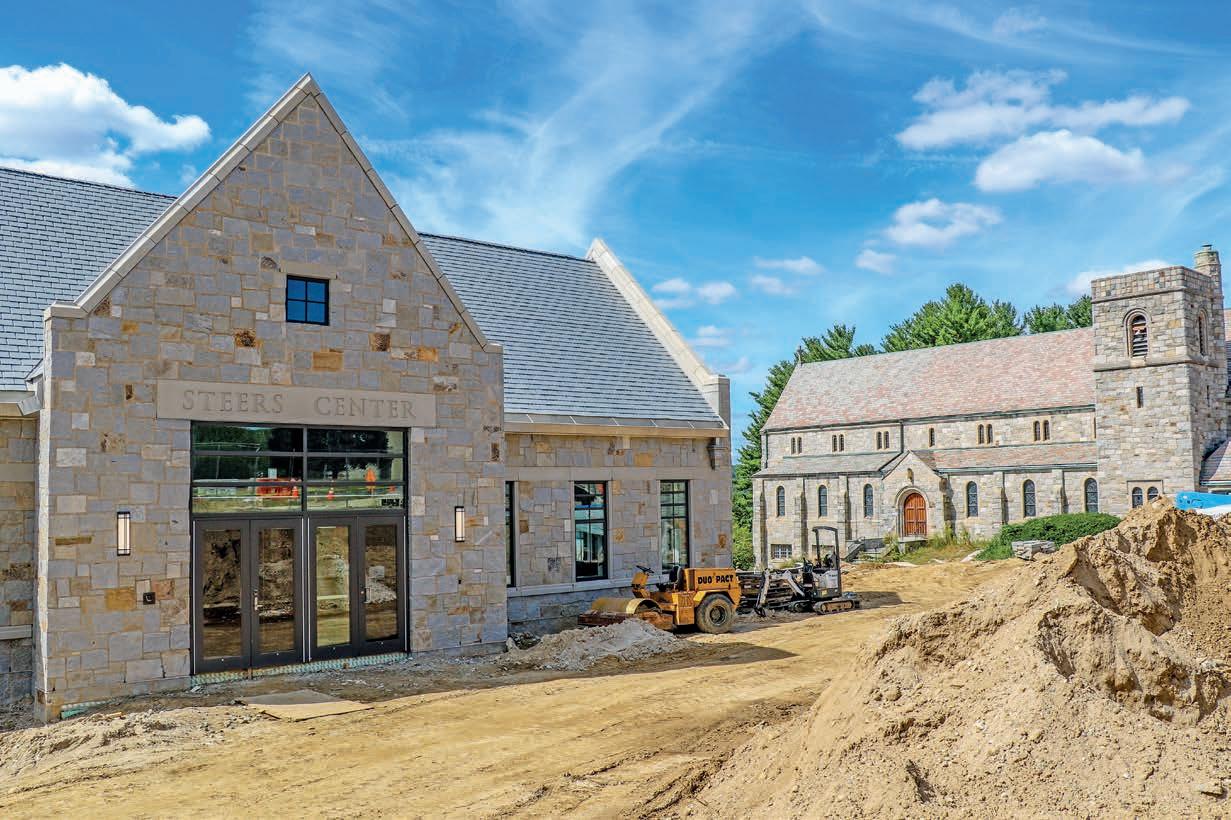
110 minute read
Academic Spotlight
THE STEERS CENTER: ACADEMIC PROGRAMMING
As we begin the 2020-21 academic year, the excitement for the opening of the Steers Center is difficult to harness. Classrooms that are structured
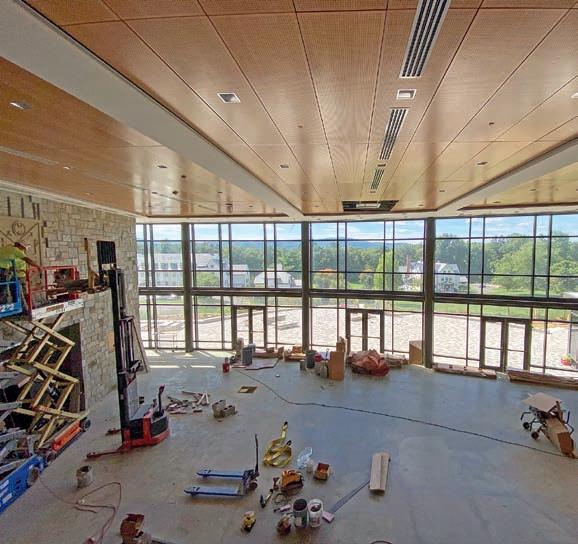
and scheduled to allow for interdisciplinary access will become the long-awaited reality along with spaces for unstructured learning opportunities and the crosspollination of academic disciplines. Included here are the courses that will be scheduled into the Innovation and Design Lab, Digital Media Lab, and the D’Amour Center for Faith, Service & Justice. In addition to scheduled courses, these spaces will provide a vital and unique hub for Canterbury students and faculty to inspire learning, weaving elements of design thinking and fabrication/ ideation processes into subject areas spanning the humanities, arts, and science.
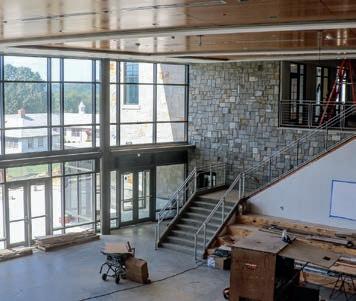
INNOVATION & DESIGN LAB
COURSES:
NEW! Design Thinking This course will provide a student-led, problem-based approach to learning.
Students will navigate the design process— identifying problems, developing prototypes, and evaluate success in order to develop solutions to real-world issues. Students will work throughout the semester to create an innovative solution to enhance the Canterbury community.
NEW! Entrepreneurship and Emerging Enterprises This course provides students a solid understanding of the vital role played by entrepreneurs in the 21st century global economy. During this course, students will assess, explore, critique, and celebrate entrepreneurship.
Entrepreneurship is approached as a way of thinking and acting, as well as an attitude and a behavior. The course emphasizes entrepreneurship as a manageable process that can be applied in virtually any organizational setting and its sustainability over the life cycle of a person’s entire career.
Robotics Our Competitive Robotics Travel Team designs, constructs, and battles their robot against those of peer institutions.
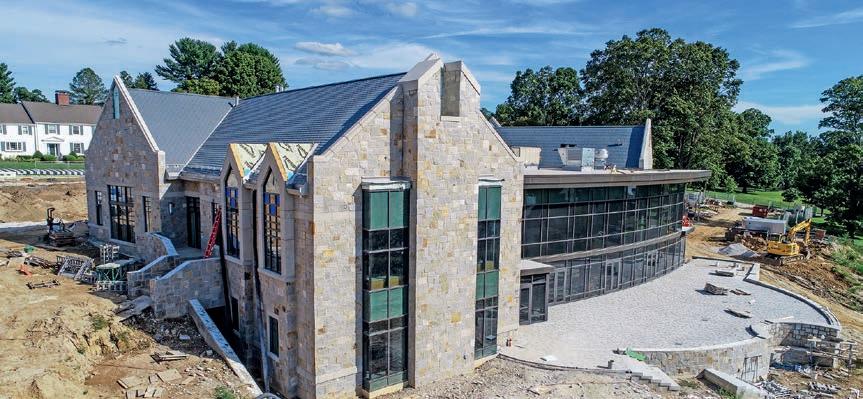
Innovation Lab This course is a hands-on, experiential class where students will have the opportunity to get their hands “dirty” by deconstructing, constructing, and repurposing materials in the pursuit of developing problem solving skills in an engaging, non-traditional format.
DIGITAL MEDIA LAB COURSES:
Syracuse University Project Advance: Introduction to Information Security See the Syracuse University Project Advance section for more information on this course. Introduction to Computer Programming In this course, students will learn basic programming skills and concepts using Python. The course is designed for students with little or no programming skills. Completion of one year of Algebra is required. Introduction to Digital Media This course will give students the opportunity to better understand the social media landscape as an avenue toward connecting with an audience, creating engaging content, and utilizing digital analytics in order to make informed and strategic decisions. Students will explore various social media platforms, research business profiles, and analyze case studies. This course will include web conferences with industry experts and off-campus site visits.
Service Learning: Social Justice Students in this course will explore social justice issues, the foundational principles of Catholic social teaching, and apply their knowledge and faith to their experiential service work by engaging in an ongoing community service project. This course requires students to engage in learning about the organizations and communities they serve, the challenges they face, and issues of social justice on a local, national, and global level. While students engage in their service projects independently, they meet as a group to examine the theological foundations of social justice, discuss readings, current events, and to share reflections on their experiences. The coursework includes assigned readings, a reflection journal, and culminates with a final project presentation or research project.
NEW! Spiritual Journey Readings from scripture, literature, modern theologians, and spiritual heroes will be our guides through an exploration of the theme of life as a journey toward reality, universal truth, and ultimately God and spirituality. Students will also specifically explore the concept of pilgrimage. This course will cover topics such as mindfulness, spiritual renewal, intentional travel, and the sacred journey. Inspired by formulating more questions than answers, the value of searching for those answers, and the process of discernment, students will challenge themselves to consider how responses to experiences allow opportunity to draw into deeper understanding and connection with God, self, and others.

SYRACUSE UNIVERSITY PROJECT ADVANCE (SUPA)
Did you know that in addition to our over 50 Advanced Placement (AP) and Honors classes, we also off er four diff erent Syracuse University Project Advance courses (with more to come in the future)? The SUPA program was launched in 2019 and gives our students the opportunity to earn college-level credits while at Canterbury. Students may opt to take the course for Canterbury credit only or receive Syracuse University credit as well. They can then graduate with their Canterbury transcript and an SU transcript! Saints can take SUPA Principals and Contemporary Issues in Sport Management (we’re currently the only school in Connecticut that off ers this), SUPA Introduction to Information Security, SUPA Gender and Literary Texts, and SUPA Economics of Personal Finance. Director of Curriculum Kelli Darrin spoke about the success of the program and the plans to expand it in the future: “We piloted the SUPA program last year running an Informational Security class and a Sport Management class. Based on the success of those two courses, we decided to off er a more robust SUPA load this year. We had plans to add an additional 6-7 SUPA courses, but due to COVID and the shift to online learning for Syracuse University’s Summer Institute (the week-long intensive training to qualify teachers as adjunct professors), we were only able to add two more courses this year. We intend to add the other courses, and more, for the 2021-22 school year.” The SUPA program gives faculty the opportunity to design curricula that mirror what is happening on the Syracuse University campus and lets Fifth and Sixth Form students take actual college courses without having to leave Canterbury. Canterbury’s site coordinator at Syracuse University, Associate Professor and Undergraduate Program Director Dr. Gina Pauline, shared her positivity and appreciation for our program, saying, “The opportunity to take a collegelevel course in high school is terrifi c, and the program at Canterbury did an incredible job in its fi rst year. I was extremely impressed by the level of dedication of the students and instructors for the courses. Their fi nal projects (both the paper and presentations) represented a high level of academic work! I am excited to continue to partner with Canterbury in the future.” Course descriptions for each of the SUPA classes off ered at Canterbury are as follows: “The opportunity to take a college-level course in high school is terrifi c … I was extremely impressed … the fi nal projects (both the paper and presentations) represented a high level of academic work!”
Dr. Gina Pauline, Associate Professor and Undergraduate Program Director,
Syracuse University
DIGITAL COMMUNICATION, DESIGN AND INNOVATION
Syracuse University Project Advance: Introduction to Information Security Students will be introduced to fundamental elements in information security and key areas of security challenges, countermeasures, and real-life examples. Topics include security properties, vulnerabilities, cryptography, security policies, access control, authentication, fi rewalls, wireless security, Internet security protocols, security management, security evaluation, and case studies. Students will also have hands-on experiences in information security through customized online labs.
ENGLISH
Syracuse University Project Advance: Gender and Literary Texts This course will examine various literary texts through the premise that gender is a social construct, rather than a natural “essence” that expresses our true selves. To examine the ways in which literature participates in the social reproduction of gender, as well as the difference that gender makes in the production and reception of literary texts, students will practice extensive close reading, evidencebased analysis and argumentation, and independentinquiry. Raising awareness of how meanings are created through acts of critical reading, students will thus learn to analyze the ways texts construct categories of difference, including differences in gender, race, and social class.
HISTORY AND SOCIAL SCIENCE
Syracuse University Project Advance: Economics of Personal Finance This introduction to personal fi nance focuses on the foundations of fi nancial planning—such as setting shortterm and long-term fi nancial goals—and then tackles essential aspects of consumer personal fi nance, including record keeping, budgeting, banking, saving, borrowing, investing, insurance, taxes, and retirement planning. Syracuse University Project Advance: Principals & Contemporary Issues In Sport Management Offered through the Syracuse University David Falk College of Sport and Human Dynamics, this course introduces the student to sport management concepts and sectors through an examination of problems and issues faced by contemporary sport management. The unique characteristics of sport and resulting social and ethical responsibilities of sport managers will be discussed. In addition to the use of traditional pedagogical teaching methods to deliver basic sport management concepts, students are required to complete a comprehensive, hands-on project that demonstrates their comprehension of the different sectors of the industry covered throughout the semester.
NEW COURSES FOR 2020-21
In addition to the SUPA classes offered and the new courses that will take place in the Steers Center, Canterbury is introducing the following new classes, spanning several departments, for the 2020-21 school year:
ENGLISH
Honors Nature In Literature The relationship between humans and nature has always been complicated. This course will explore this complex relationship through the reading of poetry, fiction, and creative non-fiction. In the course, we will examine how writers have attempted to understand the natural world around them, and we will consider how this literature, and many other factors, have affected our feelings towards and our understanding of the more than human world. Honors Post-Colonial Literature “The Empire Writes Back”: It is often said that history is written by the victors; however, literature is written by everyone. The texts of the course are written by authors from former colonies. The course will explore and discuss the challenges and conflicts faced by people who were colonized and how, even though the authors are from a variety of geographical regions, the concerns of these authors share commonalities (identity, history, cultural heritage, nationhood, freedom, etc.).
VISUAL AND PERFORMING ARTS
The Actor’s Approach To Public Speaking Theater training develops the imagination, critical thinking, problem-solving, and communication skills that are needed for everyday life. This course uses theater techniques to help students enhance their public speaking in both formal and informal environments. Using the storytelling and character-development techniques of theatrical improvisation, participants will acquire and practice voice and speech techniques to build oral communication skills, confidence, and enjoyment in public speaking, presentation, or performance.
HISTORY AND SOCIAL SCIENCE
Honors History of Latin America The 600-year period from Pre-Columbian Americas to the present day will be analyzed through economic, social, political, philosophical, and cultural lenses to provide a clearer understanding of how historians study history and Latin America in particular. Understanding why Latin America is so connected to the United States while having its own rich and exciting history will be essential themes of this course. All of this will be done by analysis of primary sources like books, paintings, songs, journals, and cultural items. Excerpts of secondary sources will also be looked at to understand the differing conclusions historians draw from the same information. Honors Global Capitalism: From the Model T to the iPhone X Global capitalism aims to introduce students to the real-world workings of global capitalism. This project-based course will introduce students to global markets, strategies, and labor outsourcing of multinational corporations as well as the complex global supply chains employed by such corporations. Students will also examine the relentless pace of innovation and how companies develop better products and production methods to increase profit margins, expand market share, and thrive financially. Readings will come from actual business school case studies and students will be responsible for assessing and analyzing multinational companies such as Disney, Starbucks, Alibaba and Nike as well as the legendary entrepreneurs who founded these companies. Students will follow global markets on a daily basis, read regularly from the Wall Street Journal and Financial Times, and will complete independent projects that will require them to choose topics of interest that they will explore in depth. Honors Corporate Colonialism Students will learn about the rise of Multinational Corporations (MNC) and their role in imperialism between the 17th and 20th centuries as well as determining if it is still going on to this day. Three questions will frame this class throughout the semester: How did companies colonize for European empires? If it did, how did imperialism and MNC change by the 19th/20th centuries? Globalism or Imperialism? Students will look at companies as case studies throughout the centuries in question, such as the British East India Company, Belgian Free State, United Fruit Company, and Firestone. At the end of the course, students will research an aspect of MNC or Imperialism (social aspects, economic impacts, or political implications) and delve deeply into the subject to understand the nuances and impact of said aspect. Honors Global Economy: History and Practice of Investment Management Topics covered in this course include diversification, asset allocation, portfolio optimization, factor models, the relation between risk and return, active and passive investing, simulation. The course includes case studies of legendary investors such as Peter Lynch, Jack Bogle, and Warren Buffett. Students will be required to construct and manage their own investment portfolios. Advanced Placement Government and Politics Students cultivate their understanding of U.S. government and politics through analysis of data and text-based sources as they explore topics like constitutionalism, liberty, and order; civic participation in a representative democracy; competing policy-making interests; and methods of political analysis. Current Political Issues This course will serve as an introduction to current debates and issues related to civil and political violence and is divided into three parts: 1) creating an understanding of how conflicts and violence are conceptualized, measured, and the causes and triggers of conflict, 2) the consequence of conflict on people’s lives: focusing on education, health, and labor outcomes, economy, social capital, and political participation, and offer proposed forms of conflict management and 3) student-led presentations based on research conducted in the field as it relates to current events.
US Foreign Policy: Traditions, Theory and Today Students will examine prominent theories in international relations while taking part in a series of case studies and simulations. Students will then apply their knowledge of diplomatic history and International Relations theory from the course to discuss and debate the factors that contributed to events including the annexation of the Philippines, the Marshall Plan, the 1953 coup in Iran, the Cuban Missile Crisis, and the Iraq War.
SCIENCE
Science of Conservation Students will learn about wildlife conservation as a social process encompassing both lay and professional activities that define and seek to attain wise use of wildlife resources including their habitats. In addition to introducing students to the science of wildlife conservation, this course will also identify and discuss the role of government wildlife agencies and private wildlife organizations. Nutritional Science Students will explore the role that nutrition, exercise, sleep, and other health behaviors have on human function and performance. Through investigations of scientific literature, students will be able to understand the role that social, psychological, ecological, and political factors have on nutrition in society and our community.

LETTER FROM AMANDA MCGREW P ’20 TO THE COMMUNITY
Amanda’s son, Zach, graduated with the Class of 2020; she shared her appreciation for the Canterbury experience and the School’s response to COVID-19 during her son’s Sixth Form spring.
Dear Canterbury family,
Zach received his graduation box this weekend, filled with bouncy blue paper shreds, a dashing Canterbury tie, a 2020 tee-shirt, and a collection of meaningful remembrances. Ah! Graduation! Celebration! And despite all that we are doing to complete the school year, whether it is kindergarten or the senior stretch of high school, it seems as if we will carry a bit of this COVID life along with us for a while, as a sort of pocket of unfinished business. Perhaps this letter will make it so there is one less unfinished thought in that pocket.
First things first: Jason and I cannot thank all of you enough for the great years Zach has had at Canterbury. I think back to that first June evening of Canterbury 101 when Zach was a freshly minted Rumsey Hall grad, a bit apprehensive about the next step. Now he is a taller, more thoughtful and mature version of that same self; thank goodness. I am filled with gratitude for the person he has become and for the qualities in him that have grown under the very specific watch of the Canterbury community. We are so grateful for the perspective on the world that he has taken on in his years with all of you. Zach will take much from this experience, and I thought I would thank you in writing since we are graduating without our personal connections and closure.
I find myself reflecting on this a lot these last weeks: what is it that Zach will take with him as he leaves the Canterbury embrace? I am sure some of you can relate to the way in which we sometimes spend time as a parent trying to figure out what is going on in our kids’ heads. At Rumsey, as I was teaching there, it was easy to keep tabs on him. I could keep track of who he was becoming, partly due to my presence there, my familial rapport with many of his teachers, and also because of the full immersion parents can have with younger kids—homework connections, car conversations, sporting events, etc. Yes, lots of opportunities to sort through who he was and who he was becoming. As mothers, we do that. We sneak into the metaphorical rooms of our children at night and sort, tidy, shake things out a bit, and do some sweeping up. We listen closely, we peer around corners for clues to the next triumph...or the next disaster, trying to keep in perspective the meaning of both kinds of moments.
But once Zach moved on to Canterbury, I knew that it was time to relinquish some of that. Oh, there was still time for digging around in his mind now and then, but for the most part, this was how it would be for Zach to become himself. So I loosened the grip. I did not ask a million questions when I wanted to. I did not insist on going to every game. I did my best to leave it to all of you, and I have to say, you have done a wonderful job! The thing is, I cannot say a specific thank you because I am sure there are countless moments and people who have contributed to who Zach has become that I have no idea about. Because I did leave him to you. So thank you, all of you, for being there in this pivotal time of high school, when things can and do change in an instant—this is what keeps us all awake at night. I know you understand! You have a campus full of teenagers!
So here, I share my thoughts for all of you: It is you who have been tending that metaphorical room these past few years, whether you knew it or not. Through the challenging assignments and the ones that came with ease, Zach has learned how to lean in and push himself a little more. He understands better his strengths and his weaknesses. He has been able to figure out what it looks like for him to be organized, to stay happy, to work hard, to feel balanced. He knows how much can be accomplished by taking the time to touch base with a teacher. I cannot even begin to capture the breadth of the experiences: time on the fields, courts, diamond, links; the doozy of a paper for Mr. Johnson for which I am eternally grateful; the activation of the pencil to the page for drawing and architecture; the artfully-curated quest for the meaning of life in theology this year; the well-lit path through the college admissions process; and the COUNTLESS moments he has had with all of you as teachers, coaches, leaders, and role models—humans who happened to be walking the path of life alongside Zach in whatever moments as they arose.
I do not think I could put a value on who you are as a collective. You have created a very thoughtfully supportive environment at Canterbury with the right amounts of structure and warmth, where these kids are able to kick things around a bit and figure themselves out. Zach has grown to be more comfortable in his skin and has formed some very clear ideas of what kind of person and friend he is choosing to be, and I like who that is. Thank you. You probably know as well as I do that he has some fantastic friends—what a cast of characters he has met at Canterbury! I hope that in spite of the distance, you are able to celebrate who these kids have become on your watch. Please know that although we cannot really sum it up together, many of us are still adding it all up. I know I am. I find myself incredibly grateful for who all of you are and for what you have done for Zach.
So yes—“Our future is bright, but our vision is 2020”—with thanks to Canterbury.
With gratitude, Amanda McGrew
CELEBRATING THE GREAT CLASS OF 2020
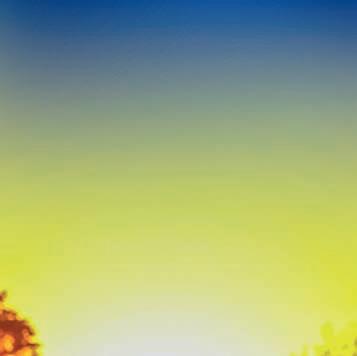





LEAVING THEIR MARK


Painting their initials on the rock beside the turf fi eld has become an annual tradition for Sixth Formers. It is an opportunity for the graduating class to leave their literal mark on the School that nurtured them throughout their high school years. Though the rock is repainted to a blank, white canvas at the end of every school year in anticipation of the graduating class, the initials of students from years prior still exist underneath all the layers. Each May, the rock grows a little with its new coats of paint and with the spirit of the names it bears proudly all year.





This spring, our students could not be on campus physically to add their names, so our faculty had the honor of doing it for them. Students elected teachers, coaches, dorm parents, and advisors to paint the rock and help them leave their mark—and each faculty member did so with love, care, and enthusiasm. The painting was livestreamed for the Class of 2020 so they could experience the event in real-time.





With all of the uncertainty that this spring brought to our hilltop and the world, we do know one thing to be undoubtedly true: the bonds and partnerships that exist between our teachers and students only grew while they were apart. We look forward to having the Class of 2020 back on campus soon and we remind them that they will always be part of this school—and the rock will always be theirs.
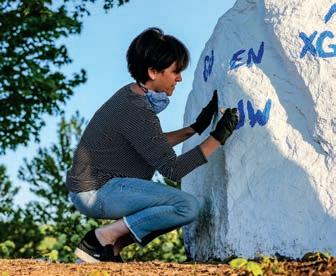



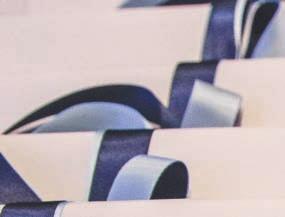

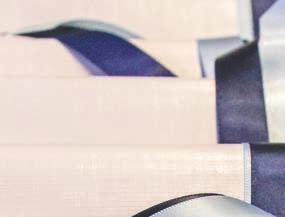





Sixth Form Awards Assembly



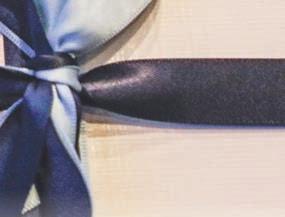




HONORS GRADUATING CLASS IN THEIR FINAL WEEK AS CANTERBURY STUDENTS
Members of the Class of 2020 were honored and presented with awards during a virtual assembly on the evening of May 19, 2020. As with the Underform Awards Assembly earlier in the week, the ceremony was livestreamed for faculty, family members, and friends, while Sixth Formers were present via Zoom to accept their awards.
The assembly opened with a prayer from Tracy GarciaLaVigne, Director of the Center for Spirituality, Service & Justice and Theology Teacher, followed by opening remarks from Head of School Rachel Stone. Rachel noted: “Collectively, you have embraced your experiences here and developed self-awareness, discipline, and confi dence along the way. That learning curve never ends; you will face it again next fall as a new round of challenges arrives. But you are ready. You know yourselves as students; you know that persistence counts just as much as intelligence—if not more—and you know that seeking help is a strength, not a weakness. The faculty and I thank and congratulate you for your good work and the impact you have made—and will leave—on our community.” Preceding the fi rst awards, Assistant Head of School for Student Life Peter LaVigne recognized all members of the class who had held leadership positions over the course of their fi nal year, including Sacristans, Sixth Form Council members, and proctors. Class of 2020 members of the Canterbury Honor Society—Sabrina
Capodicci, Jillian Carleton, Brigida Caruso, Isabella Cotier, Gabriel Diamond, Alexa Esposito, Xing Gao, Ryan Greguski, Katherine Grissmer, Yongkyung Jo, Grace LaVigne, Abigail Omaña, Cecilia Poli, Erik Stedman, Yitian Sun, Cadence Trach, Yiqi Wang, Jiayi Wu, Diqing Xu,
and Wensi Yang—were also recognized individually for their hard work and academic accomplishments, and were addressed by 2019 J.P. Mandler Teaching Award recipient Cammy Roff e.
Director of Athletics Jim Stone began the award presentation with athletic awards in several categories.
Emma Gambardella, Grace LaVigne, Gabriel
Diamond, and Justin Schneider received the Most Improved Athlete Awards. Cecilia Poli and Trayvon Alexander received the Best Leadership Awards for serving as captains on the league champion Girls’ Varsity Soccer and Boys’ Varsity Basketball teams, respectively. Victoria Congdon, Megan LeBlanc, and Jack McCluskey were presented with the Best All-Around Athlete Awards for their skills and dedication to multiple varsity-level sports.
Dean of Faculty Wright Danenbarger then presented the Edward F. Mack Awards to members of the class for their contributions to particular areas of school life. For Outstanding Contributions to The Tabard, Nicholas Vial received the award; for Outstanding Contributions to Community Service, Erin Sudbey; for Outstanding Contributions to the Cantuarian, Jillian Lanese; for Outstanding Contributions to the Women of Canterbury, MaryBridget Horvath; for Outstanding Contributions to the Sustainability Club, Maeve O’Donnell; for Outstanding Contributions to Theatre for Performance in a Female Role, Abigail Omaña and Chiara Vaccaro; for Outstanding Contributions to Theatre for Performance in a Male Role, Ryan Greguski and Nicholas Vial; for Outstanding Contributions to Theatre for Technical
Theatre, Jillian Carleton, MaryBridget Horvath, and Erik Stedman; for Outstanding Service as a Proctor, MaryBridget Horvath, Cecilia Poli, Justin Schneider, Yitian Sun, and Jiayi Wu; for Outstanding Service as an Admission Ambassador, Grace LaVigne and Andrew Mancini; for Outstanding Contributions as a Sacristan, Abigail Omaña; and for Outstanding Contributions in Student Government, the members of the Sixth Form Council:
Sabrina Capodicci, Brigida Caruso, Griffin Duffy, Griffin Fillios, Jack McCluskey, Venessa
Okoroanyanwu, Abigail Omaña, and Jackson Zavatsky.
The award presentations continued with academic honors given to Sixth Formers for specific areas of study. The Edward J. Duffy Family Award for excellence in the study of Studio Art, given in memory of Mr. Duffy by his children, was presented to Shannon Gao.
The Francis T. Carmody ’25 Award for creative talent in art, given in memory of Trustee Francis Carmody, son of founding Trustee Terence Carmody, was presented to Alexa Esposito and Diqing Xu.
The Stephen N. ’43 And Lacey Hume Award, given in memory of Trustee Emeritus and son of the founding Headmaster, Stephen N. ’43 and his wife, Lacey, was presented to Chiara Vaccaro for excellence in the study of vocal performance and to Qiyuan Wang for excellence in the study of contemporary music.
The Frederick L. Gilson ’50 Award for excellence in classical music performance was presented to Katherine Grissmer.
The John Thomas Smith Award for excellence in the study of English, given in memory of John Thomas Smith, benefactor of the School and parent, was presented to Abigail Omaña.
The English Essay Award, presented to the author of the best critical essay written for the annual Sixth Form English essay assignment, was given to Gabriel Diamond and Xing Gao.
The Francis T. Carmody ’25 Prize Awards were presented to William McMullan for creative talent in prose and to Charles Dyer and Xing Gao for creative talent in poetry.
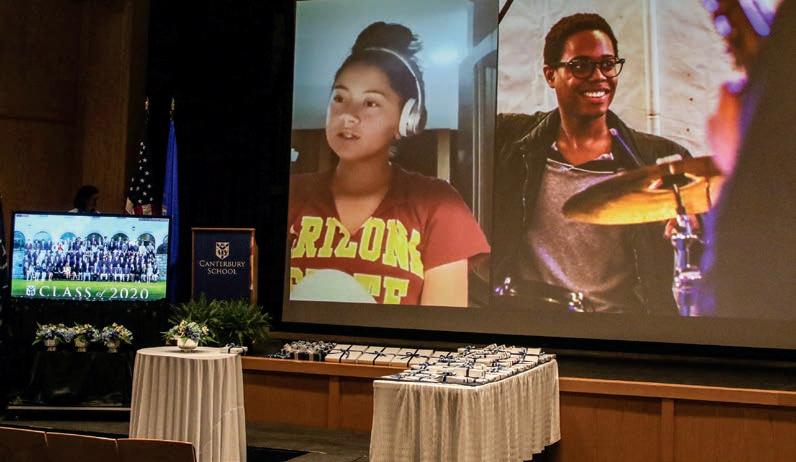
The Allan A. Ryan Award for excellence in the study of history, given in memory of Mr. Ryan, a founding Trustee and parent, was presented to Sabrina Capodicci and Jiayi Wu.
The Weldon R. Knox Award, established by the Class of 1971 in memory of Mr. Knox, who taught math from 1960 to 1975, was presented to Kasey Sarmiento. The award is given to that student who has demonstrated the greatest improvement in the study of mathematics while at Canterbury.
The James A. Farrell Award for excellence in the study of mathematics, given in memory of Mr. Farrell, a founding Trustee and benefactor of the School, was presented to Jiayi Wu.
The Hubert McDonnell Award for excellence in the study of theology, given in memory of Mr. McDonnell, a Trustee from 1938-1950 and parent, was presented to Sabrina Capodicci and Erin Sudbey.
The Canterbury Art Legacy Award, to recognize the accomplishments of advanced art students by including their work into the permanent art collection at Canterbury, was presented to Alexa Esposito.
The Terence F. Carmody Award, given in memory of founding Trustee Terence F. Carmody, was presented to Erin Sudbey for excellence in the study of Spanish and to Alexa Esposito and Abigail Omaña for excellence in the study of French. The Captain Thomas J. Sartor Award for excellence in the study of science, given in memory of Captain Sartor from the Class of 1919, benefactor of the School and parent, was presented to Erik Stedman.
The final honor, the Roderick Clarke ’46 Distinguished Academic Achievement Award, given by the Class of 1956 in memory of Mr. Clarke, who served Canterbury from 1954 to 1990 as history teacher, Director of Studies, College Counselor, and as Canterbury’s Headmaster for his last twelve years, was awarded to the student with the highest GPA. Rachel Stone presented the award to this year’s recipient and Class of 2020 Valedictorian, Sabrina Capodicci.
Sixth Form Council member Jackson Zavatsky then addressed his classmates via video (read his full remarks on the next page), and Rachel Stone closed the assembly by thanking the Sixth Form Council for their extraordinary leadership throughout the year: “In four quick days, we will celebrate the class of 2020—our 103rd graduating class—and all that you have done to earn a Canterbury diploma. Don’t forget to make time this week to laugh with your friends, to thank those who have made this journey both possible and successful, to soak in the breadth and depth of your accomplishments, and to think back to your first days and weeks on our hilltop.”
The assembly concluded with a performance of “Stand By Me” by the Contemporary Music Band and performances of “You Will Be Found” and the School song “Cantuaria Floreat” by Varsity Voices.

CLASS ORATOR JACKSON ZAVATSKY’S REMARKS
large part comes from this class. It can say that. We will know how to stand tall, even when life circumstances. We are fighters and survivors. We have Class of 2020, is all about. Our class is special; I have heard An excerpt from Jackson Zavatsky, who was selected by his fellow Sixth Form Council members to address the class. In addition to being on the Sixth Form Council, Jackson was this year’s recipient of the esteemed Class of 1987 Citizenship Award, given to a student who, in the judgment of classmates, has best fulfilled obligations to school, to fellow students, and to self. Jackson is currently enrolled at
Iam sure you all recall the feelings of anger and sadness and the culture we appropriated for Canterbury’s future is we felt when we found out we could not return this evident in the people that are in front of me today. We are spring. Throughout the past few weeks, I have realized that appreciative, generous, kind, and supportive. We are who we my own disappointment is a demonstration of one thing are. That is stronger than anything or anybody that tries to and one thing only: the bonds we define us differently. have created with each other are …we are not victims of these unmatched. The friendships that Each of you should be proud of were formed here are invaluable unfortunate circumstances. yourself for the feats you have and will last a lifetime. The love We are fighters and survivors. accomplished, and the journey that that radiates on this campus in We have learned resilience in life will soon take you on. comes from this vibrant group of the face of defeat, heartache, There were certain moments seniors, of which I am so lucky to and pain. This is the during my time at Canterbury be a part. Canterbury Saint way. when I had to pinch myself. A lot, in fact, for one reason or another… Yes, the situation may have robbed But do you ever get the feeling us of a ceremony, but know that it was not in vain: we will when you know you are in the right place, at the right time, be a part of history. We will help change the course of for the right reason? That happened a lot up there [on education, technology, and traditions. Not too many others campus]. A large part of it was because of you. tries to push us down. And we will continue to extend love Saints, seniors, friends, it has been a blessing to have been for one another. able to share in your laughs, your memories, and warmth Make no mistake, we are not victims of these unfortunate This remains true for every single one of you. learned resilience in the face of defeat, heartache, and pain. In my eyes, the Class of 2020 shall forever be immortal. This is the Canterbury Saint way. This is what our class, the Now let’s make some memories. Fairfield University, CT. this year. Your Canterbury family will forever be your family. this once or twice before. The environment we established Thank you and God bless.
Alumni-led Senior Seminars Help Prepare the Sixth Form for Their Next Chapter
As part of their “Senior Week,” the Sixth Form was able to connect with recent alumni during “Skills4Life” and “College 101” seminars organized by English Department Chair Lindsay Mulhern. Twenty-three alumni led conversations and fielded questions for the graduating class to help prepare them both mentally and logistically for their first year of college. The seminars covered a range of topics, and began with a morning session entitled “The Transition from Canterbury to College: What Do I Need to Know?” Alumni Nick Toth ’18 (Rochester Institute of Technology, NY), Sherley Arias-Pimental ’19 (University of Richmond, VA), Coco Booth ’19 (Fairfield University, CT), Stone Huang ’18 (Villanova University, PA), Raif Harris ’19 (University of Connecticut, CT), Maddie Milazzo ’19 (St. Lawrence University, NY), and Steven Sigillito ’18 (University of Colorado at Boulder, CO) all spoke about their experiences in their first year(s) of college and how they felt prepared to be able to make the adjustment. An afternoon session titled “Outside of Classes, Oh My… What Do I Do with All of My Time?” was broken down into several seminars that covered a variety of extra curricular opportunities. Lillian Delehanty ’17 (Duke University, NC), Sherley Arias-Pimental ’19, JP Loughran ’16 (Georgetown University, DC), Eli Taylor ’19 (Fordham University, NY), and Nick Toth ’18 all discussed ways for incoming college students to get involved on campus. Ellen Fritz ’18 (Franklin and Marshall College, PA), Mary Grace Cordtz ’17 (University of Virginia, VA), Brendan Desmarais ’18 (Quinnipiac University, CT), and Tommy Mason ’17 (University of Delaware, DE) talked about their experiences with social and student life at their schools. “Interscholastic College Athletics: What Does it Mean to be a College Athlete?” was led by Gabby Vitelli ’18 (Quinnipiac University, CT, DI Women’s Ice Hockey), Bryan Powell ’19 (Pace University, NY, DII Men’s Basketball), Jericho Petkovich ’18 (Trinity College, CT, DIII Men’s Ice Hockey), Katherine Hesslink ’19 (Bentley University, MA, DII Women’s Lacrosse), Korbin Pecora ’19 (Yale University, CT, DI Men’s Lacrosse), and Emily Martino ’17 (Hobart and William Smith Colleges, NY, DIII Women’s Ice Hockey). Several young alumni recently participated in study abroad programs and shared their application processes and overall experiences with the group; Jed Dowler ’17 (Villanova University, PA) studied in Milan, Italy, Sarah Buckingham ’17 (Franklin and Marshall College, PA) studied in Madrid, Spain, and Connor Dow ’17 (Providence College, RI), studied in Rome, Italy. The seminars not only offered firsthand, applicable advice to the Class of 2020, they also created—or strengthened—connections to the Canterbury alumni network. The Sixth Form was able to meet (or catch up with) their alumni friends, and some will be able to continue that relationship as they reunite at the same college this fall.
Senior Chapel Service

To start off the school year, the Sixth Form concludes their Leadership Weekend with a chapel service that offers class members the opportunity to set goals and intentions for their final year. The chance to look back on those objectives is presented on the eve before Commencement, bringing the whole class together one last time to reflect on their time at Canterbury before they graduate. Initiated three years ago, the chapel service is designed as an open forum that allows students to address their class. Many students share what their time at Canterbury has meant to them and what has motivated them to reach the goals they set for themselves. Brigida Caruso ’20 (New York University ’24), a Sacristan, Sixth Form Council member, and Day Student Proctor shared her experience at the service: “It was touching to hear all the ways Canterbury has impacted the lives of my peers, each unique to the person. There was a common sense of community and gratitude for the experiences shared. It also made me realize what wonderful and caring people occupy the hilltop and make it so special.” Though the service couldn’t be held in person, Brigida ’20 noted that the service still felt personal and important as class members opened up about the positive impact of their time at the School: “The time in the chapel was meaningful to me because, although virtual, it would be one of the last times together as a class. I was able to hear from many different classmates, some of whom I did not expect, which made the event even more special. Despite all our differences, we are connected through our time at Canterbury, and seeing everyone come together and reflect only confirmed this.” The following morning, before the start of Commencement, about 20 members of the graduating class tuned in virtually for Senior Sunrise. They watched one last sunrise over Sheehy Family Field and many of them shared the view of the sunrise wherever they happened to be at that moment.
103rd
COMMENCEMENT EXERCISES

Canterbury’s 103rd—and first virtual— Commencement Exercises were celebrated on Saturday, May 23, to honor the Class of 2020. The week leading up to Commencement was full of activities and opportunities for the graduating class to be together, albeit virtually: Sixth Formers were presented awards for their contributions in academics, athletics, and service; attended seminars with Canterbury alumni to help prepare them for college and life beyond the hilltop; displayed their collegiate destinations on College T-shirt Day; presented their Sixth Form projects; and held a virtual Sixth Form Retreat to reflect on their time at Canterbury and the goals they’ve achieved while here. The annual Baccalaureate Mass, celebrated by Fr. Mark Connell, occurred in the Chapel of Our Lady the evening prior, and was livestreamed for the class and their family members. The Commencement Exercises were livestreamed from Maguire Auditorium with the graduating class participating via Zoom to receive their awards and diplomas. The ceremony began with a light-hearted video of faculty getting ready for the big day before Head of School Rachel Stone addressed the graduating class, noting that she had started her Canterbury journey with several of the class members four years ago (read her full remarks on the next page). Following Rachel’s

address, a photo slideshow of the class was presented, highlighting special moments from this past year and, for some students, as far back as their Third Form year. Key speakers at the ceremony included Michele D’Amour P ’93, ’98, GP ’20, ’22, ’23 and the Class of 2020 Valedictorian Sabrina Capodicci, who both captured the challenges and opportunities brought forth by the coronavirus

Clockwise from top left: The great Class of 2020; Dean of Students Jake Dellorco prepares class members to receive awards; diplomas await eager Sixth Formers; (left to right) Dean of Faculty Wright Danenbarger, Director of Curriculum Kelli Darrin, and Associate Head of School for Academics Sue Roberts facilitate the ceremony in their regalia; livestreaming of the virtual ceremony from Maguire Auditorium.

pandemic this spring, and immense gratitude and pride to be part of the Canterbury community. The 104-member class was awarded their diplomas, with each student virtually joining Rachel Stone on stage, marking the Sixth Formers’ transition from Canterbury students to alumni. Though students accepted their diplomas from their own homes, the energy and excitement was palpable as their smiles radiated through the screen.
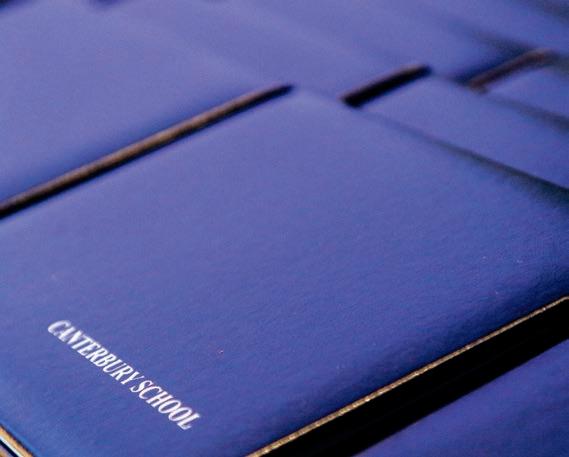
The ceremony closed with a benediction from Fr. Mark Connell and with a virtual “handshake” and words of congratulations from each faculty member, ending the year as it began for the class back in September. Congratulations to all our 2020 graduates; we can’t wait to see you again and celebrate in person!
OPENING ADDRESS FROM HEAD OF SCHOOL RACHEL STONE

Good morning, and welcome to Canterbury’s one-hundred-third Commencement Exercises, and first virtual Graduation. Thank you for joining us today—from across campus and around the world. We are grateful to celebrate the Class of 2020 with such an impressive cross-section of the extended Canterbury family: our faculty and staff; trustees, parents, grandparents, relatives, and friends; Fr. Mark, Mrs. D’Amour; and especially, the Class of 2020, 46 of whom are diehards. I will admit that I struggled to pull my thoughts together for this morning’s remarks. The threads of ideas seemed too varied and too many, and I would get emotional just thinking back to starting this new chapter of our family’s life and work at Canterbury when many of you were Third Formers. This would then turn into unproductive bouts of nostalgia, whether I was remembering Jackson and Zach’s field hockey announcements last fall, the Sixth Form/ Faculty handshake at your opening dinner, and Runtian quietly standing up to speak that evening in the chapel as part of your retreat… or aching for all of you who missed your production of Chicago, one final lunch with your advisor, and your spring athletic season as Saints. I knew I had to snap out of it when I realized I was already feeling sad knowing how much I would miss Andrew and Meg next February on our shared birthday. So, after going for a walk Wednesday evening, I decided: it’s time to go back to the beginning. No surprise, it is a big deal to me that the Class of 2020 is my first four-year diehard class. This journey has been ours, and you have played the most significant role in helping a new Head of “Thank you for being my, and Mr. Stone’s, diehard copilot class. For never taking this place for granted. For managing the disappointment and disruption of this spring with grace, humility, and resilience. And for loving this school, and one another, so deeply.”
School fall in love with Canterbury. Thank you. I don’t think any of us can honestly remember my remarks during the Installation Ceremony in September 2016 (though I’m pretty sure we gave you cookies ahead of time!), so I went back and re-read them. The following paragraph helped me break out of the writing rut I was in: To join the Canterbury family is to become a member of a community united by love for this place, this experience, and the countless people with whom we cross paths along the way. If you take a moment to consider that this shared affection for Canterbury is spread across the country and around the globe, the collective and enduring impact our School has made is breathtaking, isn’t it? Let me weave in a sense of privilege with gratitude and pride; this family is not one to take for granted.
And there it was—the glue to pull all those threads together: This family is not one to take for granted.
This is why. Over the past several months, the coronavirus pandemic and resulting medical crisis have forced the question: what do you now appreciate that you may have taken for granted prior to being isolated from friends, family, and community? It’s a good and fair question, and certainly all of us have taken stock of what we value most, what we miss most, and how we will prioritize our time, our endeavors, and our choices moving forward. But here’s the thing: I believe that the Class of 2020 already knew not to take this campus, this experience, this family, for granted. How do I know? I know, because when I first ran into Erin, standing under that tree near the baseball field during her first days on campus and my first days with students on campus, she trusted a brand-new Head of School enough to let me try to be helpful to her. (Erin—I didn’t know where your soccer practice was either, but it looks like everything has worked out!) I know, because Abby stood up in a School Meeting this year and said: “We already support each other in everything we do. Now we need to support each other in everything we are.” Several weeks later, Sabrina stood up
in School Meeting, turned to face all of you, and said: Everyone goes through tough times. If you need someone, I will be that person for you. Gabe said the very same thing in Senior Chapel last night. I know, because Alex decided to play football as a senior, Nessa brought AHANA to life on our hilltop, and Darren-Neil laced up skates and played hockey for the first time this winter. I know, because you showed up for Bella and CC during their soccer championship journey, and for Charlie, Gabe, Mike, Tray, Marlon, and Mike for their basketball title. And because the football team stood behind one another all the way to a Bowl game, even when Joey and Trent had to stand from the sidelines. I know, because the Sixth Form’s deep affection for Mr. Bice, who passed earlier this year, stemmed from your appreciation for his patience, wisdom, and guidance. Mr. Bice was there for you, and you did not take him for granted. I know, because of Jack’s brave and emotional Saint on the Hill. I know, because all of you chose a school and community that leans in to those ‘inbetween’ moments of our lives together on this hilltop: dropping by to chat with your advisor, hanging out in the dining hall long after you have finished off a piece of cake or cup of yogurt (with peanut butter and chocolate chips, of course), talking with your coach after practice, taking a deep breath in the CSSJ, and celebrating at the announcement of a Cereal Night. You chose a school, and family, where we do not take our time together for granted. The week before you left for spring break, we had a power outage on campus. Some of you hunkered down in South House, but most of our Sixth Form boarders were packed into Steele, studying in conference rooms and the Admission Office, chatting in the dining hall, cheering at the opening of the snack bar. You didn’t whine, and other than wondering where you would sleep that night if the power did not return, you were really good sports. I think we can all agree, though, that what you knew then about not taking this place for granted, you know even more acutely (and a little painfully) now. I’m pretty sure that the Class of 2020 would all show up on campus tonight to be stranded together in Steele Hall for two hours. Snack bar or no snack bar. And I would be right there with you. Thank you for being my, and Mr. Stone’s, diehard copilot class. For never taking this place for granted. For managing the disappointment and disruption of this spring with grace, humility, and resilience. And for loving this school, and one another, so deeply.”
J.P. Mandler Teaching Award

The J.P. Mandler Teaching Award was created in honor of J.P. Mandler, who retired in 2017 after serving the School for 46 years in the roles of English Department Chair, Dean of Faculty, Director of Technology, Dean of the School, Senior Master, and longest-tenured faculty member. The award is presented each year to that faculty member who reflects the fundamental commitment to excellence in classroom teaching. As with most things, this year was a little different—the award was presented to the entire Canterbury Faculty. Associate Head of School for Academics Sue Roberts presented the award, saying: “Today I would like to recognize the time and energy put forth by every faculty member at Canterbury who responded rapidly to the demands of distance learning. Our faculty managed to make this shift—to learn new technologies, redesign courses to humanize digital instruction, and connect and collaborate with colleagues, while also managing their own lives, health, and families under COVID-19. The attention, reflection, and care our faculty brought to both their teaching and their students during this time is nothing short of extraordinary.” Sue went on to say, “I’d like to take this moment to pause—to notice the gravity and coordination of this very pivot. What we all have just accomplished, and are still accomplishing, is a magnificent achievement that should give us all enormous faith and trust in our faculty. As noted in the award description, the J.P. Mandler Teaching Award is presented each year for the fundamental commitment to excellence in classroom teaching. While we will all remember the 2019-20 academic year for the disruptions and chaos to humankind, each time we walk through Steele Hall and pass the J.P. Mandler Teaching Award, it will forever be remembered that we would not be where we are today without our faculty.” This is the first time since the award was established that it has been presented to multiple faculty members.
Honorary Diploma Awarded to Visual and Performing Arts Chair Kim Tester

During the Commencement ceremony, Visual and Performing Arts Department Chair Kim Tester was awarded an honorary diploma for her 30 years of dedicated teaching and service to the School. “Kim’s tenure here is certainly a result of how much the School values her work as an exceptional teacher in the Visual and Performing Arts Department,” Associate Head of School for Academics Sue Roberts noted. “Few are those who graduated in the last three decades who have not been impacted in ways large and small by her influence and dedication to teaching visual art. The School thanks Kim for her commitment to her students and her stewardship of the Visual and Performing Arts Department.”

Commencement Speaker
Michele D’Amour, M. Ed. P ’93, ’98, GP ’20, ’22, ’23 was the chosen Commencement Speaker for the Class of 2020. Michele’s professional accolades include 50 years in the family business—Big Y Foods, Inc.—where, prior to her retirement in 2019, she most recently held the position of Educational Partnership Administrator, a role responsible for community initiatives such as Kids Count with Big Y and Homework Helpline. A graduate of Westfield State College, MA, Michele holds a Master’s Degree in Education from American International College, MA. She has had a variety of teaching experiences and has also worked at the college level supervising student teachers. She has served on many boards and committees over the years and has a long record of philanthropy, primarily focused on education and the arts. She currently serves as chairperson of the board of Pope Francis Preparatory School, MA, and has served many years as chairperson of the Parent Television Council, CA, and as trustee of Assumption College, MA. She has received much recognition for her philanthropic work, including an honorary doctorate of human letters from Assumption College, the National Catholic Education Association’s Elizabeth Seton Award, and the Association of Fundraising Professionals Outstanding Philanthropist Award. Together with her husband, Donald, Michele has raised five children—two of whom are Canterbury graduates of the classes of 1993 and 1998—and enjoys her 12 grandchildren, three of whom are Canterbury Saints, with one earning a diploma with the Class of 2020. Through a historic $1 million gift to Canterbury in 2019, Michele and Donald named the D’Amour Center for Faith, Service & Justice, which will be housed in the new Steers Center and will centralize the School’s community service, social justice, and servant leadership programming. During the virtual Commencement ceremony, Michele addressed the graduating class via video and shared her “five keys to success” for living a good life: Sacrifice, Grace, Humility, Wisdom, and Gratitude. An excerpt of her speech follows: “... What is the difference between your education at Canterbury School and the education you may have received elsewhere? Both would no doubt have provided you with the opportunity to take challenging courses, be part of your desired sports teams, or be involved in the performing arts. The difference between a faith-centered education and public education is that your life together here on this campus, both in the classroom and out, is guided by something larger than yourselves. Here you have been prepared to become citizens of society and citizens of the city of God. This means living in grace, possessing the wisdom of what is true and what is good, and understanding the strength in humility and the importance of sacrifice and gratitude.

Because of the coronavirus, you have had an opportunity—yes, an opportunity—to look inward and bring forth the skills you have learned to become a successful human being. You have untold strengths, resources, and talents inside you yet to be discovered. Oftentimes they are discovered in the midst of when life seems to be going all wrong. I would suggest that this world health crisis is just one of these moments where you were tested in how to gracefully receive sacrifice and summon the wisdom and humility to not only make it through a difficult situation but rise up in service. Your plans, on many levels, were dashed. Disappointment set in when you discovered there would be no prom and no formal graduation, no last hurrah with your Canterbury family. Perhaps some of you have family members who are or have been ill from the virus or your parent lost their job because of it. Open your mind and heart to the lesson that lies in the disaster, and you will be “taught” what to do next. Open your mind and your heart to life. As you “commence” a new chapter in your lives, be it on to college or whatever postgraduate experience you have chosen...be open to opportunities to trying something new. You may find that what you think you want to do is not what God wants you to do. Develop an appetite for learning and learn to hear what God is asking of you. Let your life be a shining symbol for others. Let everything you do be in service to others…. …My prayer is that you did not sleep in when the major lessons of sacrifice, grace, wisdom, humility, and gratitude were taught at Canterbury and modeled at home by your parents and that you move forward to accomplish great things. Congratulations to each and every one of you!”

COMMENCEMENT AWARDS
Several Sixth Formers were presented with special awards during Commencement to honor their contributions to the School.
The Roderick Clarke ’46 Distinguished Academic Achievement Award was presented to the Class of 2020 Valedictorian Sabrina Capodicci.
The Robert M. Steele ’72 Scholar-Athlete Trophy for academic and athletic achievement was presented to Ryan Greguski.
The Charles R. Huntington Scholar-Athlete Trophy for academic and athletic achievement was awarded to Isabella Cotier.
The Elizabeth (Betty) Burke Award, given to a Sixth Former whose time at Canterbury has been marked by a cheerful determination to serve God and others, was presented to Grace LaVigne and Justin Schneider.
The Class of 1987 Citizenship Award, given to a student who, in the judgment of classmates, has best fulfilled obligations to school, to fellow students, and to self, was presented to Jackson Zavatsky.
The Richard L. and Mary Catharine Farrelly Award, presented to the Sixth Former who serves Canterbury quietly, but thoroughly, was given to MaryBridget Horvath.
The Philip H. Brodie Award for exceptional achievement and all-around service to the School was given to eight students: Sabrina Capodicci, Jillian Carleton, Brigida Caruso, Gabriel Diamond, Ryan Greguski, Grace LaVigne, Venessa Okoroanyanwu, and Abigail Omaña.
The Dr. Nelson Hume Award, given to the Sixth Former whose leadership, character, and achievements have been of the highest order, and whose performance embodies the ideals of the founding Headmaster, was presented to Erin Sudbey.
VALEDICTORIAN REMARKS BY SABRINA CAPODICCI ’20
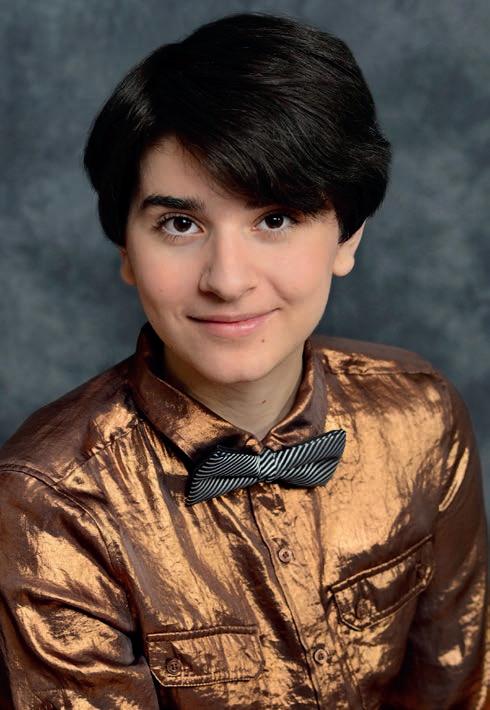
half years of fond memories that came before [our fi nal spring semester]. I know I’ll always remember the cheering and camaraderie of the Pink Out, the powerful moments spent around the bonfi re after a rousing pep rally, many emotional moments at the Emmaus retreat, and all the incredible plays, music performances, and art shows. Us diehards were around for Mr. Kiefer’s eventful Foundations of Civilizations, Ms. Behan’s grueling but rewarding Honors Bio, and Mrs. O’Meara’s endless patience as we repeatedly forgot how to use the databases for our research papers. Indeed, we are actually Mrs. Stone’s fi rst diehard class. When she was installed as Head of School, we were a little band of freshmen getting restless in our seats, and now look how far we’ve all come. So let us take a moment to be grateful, as many of us have in advisory these past few months. First and foremost, we owe our This is an excerpt from a speech that was delivered on video by Valedictorian Sabrina Capodicci and shared live with the Class of 2020 at their Commencement on May 23, 2020. Sabrina was the recipient of the Roderick Clarke ’46 Distinguished Academic Achievement Award for Sixth Form, one of eight recipients of the Philip H. Brodie Award for exceptional achievement and all-around service to the School, recipient of the Allen A. Ryan Award for excellence in the study of history, and recipient of the Hubert McDonnell Award for excellence in the study of theology. She was a member of the Sixth Form Council and the Canterbury Honor Society, an actor in the fall theater production of All I Really Need to Know I Learned by Being in a Bad Murder Mystery, and an actor and co-writer in the winter original
Nothing can spoil the three-and-aproduction Secrets. She is currently enrolled at the University of Notre Dame, IN. thanks to Canterbury—its teachers, staff , administration, and everyone who lends their time and talents to make our school as wonderful as it is. We know that the adults on campus are not just instructors (or drill sergeants on the athletic fi eld!) but are also our mentors, dorm parents, advisors, and yes, our friends. Let us thank our families for the sacrifi ces they’ve made to send us here—and thanks for the late-night pickups, all you day parents out there! But on this day that is celebrating us and the numerous impacts we have had, let us reserve our deepest gratitude for one another. Our friends help us through our homework and help us through our toughest times. They support us at our highest highs as we step on the stage or the fi eld, and they support us at our lowest lows when we desperately need a shoulder to lean on. Thank you for the lessons and the memories, everyone. I know we have forged bonds here that even a pandemic cannot break. Finally, I want to leave you with an incredible poem that’s stuck with me ever since I read it in Mr. Bush’s legendary sophomore English class. William Ernest Henley’s “Invictus” has gotten me through everything from AP week slumps to quarantine blues, and I hope these words will inspire you as you consider where your future might take you. Out of the night that covers me,
Black as the Pit from pole to pole,
I thank whatever gods may be
For my unconquerable soul.
In the fell clutch of circumstance,
I have not winced nor cried aloud.
Under the bludgeonings of chance My head is bloody but unbowed.
Beyond this place of wrath and tears
Looms but the Horror of the shade
And yet, the menace of the years
Finds, and shall fi nd, me unafraid.
It matters not how strait the gate,
How charged with punishments the scroll
I am the master of my fate;
I am the captain of my soul.
And with that, I want to leave you feeling the true spirit of the Class of 2020. I wish each of you the best as we take another step towards our destinies, and remember—our futures are so, so bright… but our vision is 2020.
Class of 2020 College Matriculation List



OUR GRADUATES ARE OFF TO GREAT PLACES!
Belmont University Bentley University Boston College Boston University (3) Brown University (3) California State University, Stanislaus Carleton College Central Connecticut State University Clark University Clarkson University Colby College College of Charleston College of Saint Rose Connecticut College Denison University Elon University (3) Emerson College Fairfi eld University (4) Fairleigh Dickinson University Georgetown University Gettysburg College Hamilton College Hobart William Smith Colleges Indiana University, Bloomington (2)

Iona College Ithaca College (3) Manhattanville College Marist College Miami University, Oxford (3) Middlebury College Nassau Community College New York University (4) Pomona College Providence College Quinnipiac University (2) Rice University Roanoke College Rochester Institute of Technology Roger Williams University Sacred Heart University San Diego State University Santa Clara University Skidmore College Southern Methodist University Stetson University Stonehill College Susquehanna University Temple University

Trinity College (3) Trinity College Dublin Tu s University University of Arizona University of California, Berkeley University of California, Los Angeles (3) University of California, Santa Barbara University of Connecticut (2) University of Denver University of Notre Dame University of Ottawa (2) University of Rhode Island University of Richmond University of Rochester University of San Diego University of Southern California University of Tampa University of Vermont Vanderbilt University Western New England University Wheaton College Worcester Polytechnic Institute Yale University




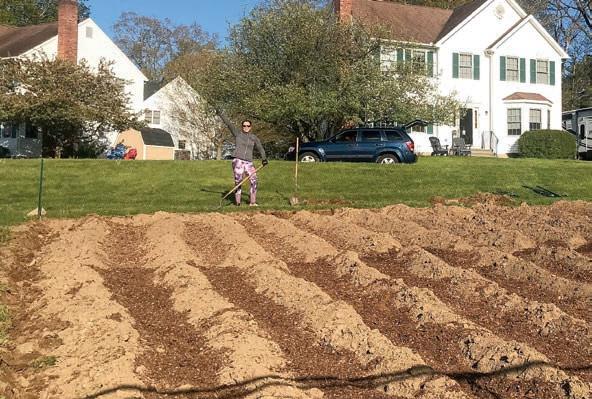

CHARLES HOLLINGER
A F sh S rt COMMUNITY GARDEN BRINGS NEW LIFE—AND ORGANIC PRODUCE—TO THE HILLTOP

By Meredith Berry-Toon
After weeks of baking copious amounts of banana bread, a group of faculty members decided in mid-April that it was time to follow the next quarantine trend—to construct a community garden. With inspiration pouring in from timely online articles and expansive green fields on campus to plot out a harvest space, the spring months in quarantine were the perfect combination of time and weather to successfully complete the project.
For those involved, the desire to help with creating the community garden was a mixture of practicing sustainability, spending time in nature, and working towards an attainable common goal. “I knew I wanted to get involved as soon as the idea of a community garden was pitched,” noted Ms. Ruderman, faculty in the Science Department. “Especially during this quarantine, it was a wonderful way to get out of the house in a safe way and to put physical work into something with concrete rewards.” Mr. Hollinger, faculty in the Visual and Performing Arts Department, added, “Gardening gave me purpose in the quarantine months. It made me get outside, be physical, and be accountable for taking care of something.” The community garden also provided faculty with an opportunity to share previously honed habits with others. Several on-campus families compost regularly and most faculty grow herbs or farm small, raised-bed gardens in their own spaces. The community garden became a place for faculty to be together and learn from one another in these practices. Not only was the project a group effort from the start—from site planning to construction to sowing the seeds—the garden’s continued cultivation included collaboration from every academic department on campus. With Mr. Hollinger (Visual and Performing Arts), Mrs. Lord (English), and Mr. Hewston (History) spearheading the project, Mr. Roberts (Mathematics), Ms. Ruderman (Science), and Mr. Lord (Languages) provided ample help in weeding and harvesting the plants. Mrs. Omaña (Theology) and Mr. Roffe (Innovation) aided the project as well— by taste-testing the plants once they were grown and admiring the quickly-sprouting blooms! The team even used the compost created from our Dining Hall’s scraps as fertilizer. As of late July, sunflowers have shot up on either side of the garden, towering over the garden walls with their faces open towards one another as if participating in a continuous conversation. The tomato plants have wrapped tentacles of vines around the homemade fences, and the corn stalks are budding several feet off the ground in time for an early fall crop. Beans, peppers, potatoes, carrots, cucumbers, melons, and a variety of herbs have all also popped up in the garden and grown tremendously within just a few months of being planted. While the sustainable gardening aspect of the project was a pull for many of those who committed their time, the community aspect was equally important. “It helped us maintain a sense of togetherness,” remarked Mrs. Lord. “So while we couldn’t all be physically near each other, we could feel connected through a common goal.” And the delicious and plentiful mid- and latesummer rewards were definitely an incentive! With the full community back on campus, those involved with creating the community garden plan to map out studentoriented programming to invite student participation.
C L U B S
MAKING AN IMPACT FOR YEARS TO COME

One of the main tenets of a Canterbury education is an emphasis on students taking an active role to build and participate in the School community and the world beyond.
Our students are central to our priorities and programming and they have great ideas; if they can envision something, we make it happen. Saints have taken the lead on a diverse assortment of clubs and initiatives, gaining support from their peers and faculty to grow their interests and discover new ones. They have created open and inclusive spaces to teach, learn, and empathize with a wide array of topics, including climate justice and environmental issues, diversity and belonging, and gender and identity. We talked to several members of the Class of 2020 about their student-led initiatives and their hopes for creating a lasting impact on the community.


Ryan Greguski ’20 (Middlebury College ’24) makes his way down the slopes during one of the Outing Club’s ski trips.
Top of page: Sustainability Club president Maeve O’Donnell ’20 (Stetson University ’24), and members Kayla Jendras ’20 (Providence College ’24), MaryBridget Horvath ’20 (Hobart William Smith Colleges ’24), Qixiu Yao ’22, and Benjamin Secor ’21 build a compost system next to the chicken coop.
C L U B S

SUSTAINABILITY CLUB
Maeve O’Donnell ’20 Originally founded in the 1990s as the Environmental Club, the Sustainability Club was revamped by science teacher Cammy Roffe and several students in 2017. Maeve led the Sustainability Club this past year to help create awareness and action for environmental issues. She was presented with the Edward F. Mack Award this spring for her Outstanding Contributions to the Sustainability Club and was also involved with Women of Canterbury and the Diversity and Inclusion Club. A die-hard (four-year) student, Maeve was on the field hockey and crew teams throughout her time at Canterbury. She is attending Stetson University, FL where she plans to major in aquatic and marine biology. Tell us about this club’s mission and how you got involved. The club’s mission is to inform and educate people about environmental issues the planet is facing. Everything we do is with the goal of planting a seed—even if it’s just one small thing that sparks interest for someone, maybe one day they’ll think about it a little more and start to see what Sustainability Club was all about.
What (or who) inspired you to take on such an active role in this club? Mrs. Roffe was my biology teacher and Varsity Field Hockey coach in my Third Form year (the year we won the New England championship!). Mrs. Roffe decided to change our Environmental Club to a Sustainability Club, and I remember coming back to campus in the fall and wondering, “what does ‘sustainability’ mean?” When she explained it, I knew that was exactly what I’ve been passionate about for so long, and what I wanted to dedicate my future to. I think growing up on Long Island, living two minutes away from a preserve and ten minutes away from the beach, played a role in my passion for the environment. So did my dad—he loves hiking, camping, and the outdoors, and he shared that love with me.
What do you hope members gain from being involved? I hope members gain an understanding of the role they all play in the health and status of our planet, and our community as well. A big thing I struggled with was figuring out my impact on the planet and on my community. I would wonder if all the work we did was pointless because a few people making the switch to going plastic-free, vegan, and zero-waste wasn’t going to stop global warming. But Mrs. Roffe taught me that even though our impact may be small as individuals, we have to keep planting those seeds, cutting down our own plastic intake, and reducing our own carbon footprints because it can make an impact on the people around us.

Venessa Okoroanyanwu ’20 The Canterbury chapter of AHANA was started in 2019. This year, Venessa led AHANA and helped foster a space for students of color from every grade. In addition to AHANA, Venessa served on the Sixth Form Council, the Canterbury Diversity and Inclusion Club, the Gender-Sexuality Alliance, and the Special Events Committee, and played on several sports teams. She was a recipient of the Edward F. Mack Award for Outstanding Contributions in Student Government and the Philip H. Brodie Award for exceptional achievement and allaround service to the School. Venessa is enrolled at the University of Richmond, VA, and plans to double major in biology and healthcare studies.
Tell us about this club’s mission and how you got involved. The overall goal of AHANA is to provide a space where students of color from every grade can meet, interact with, and support one another.
What were some of the most signifi cant things you learned from your leadership role? The most signifi cant thing that I learned was the importance of having a purpose. There were times that I was overwhelmed. During those moments I really had to remind myself that AHANA isn’t about me, but about future students of color, and ensuring that they have support. I hope that AHANA gives students of color a space to provide familiarity, support, and friendship to one another.
Do you plan to start or join a similar club in college? I plan on being heavily involved in multicultural affairs at my college by joining student organizations like the Black Student Alliance and the Multicultural Student Solidarity Network, as well as by participating in different conferences and programs offered by the Offi ce of Multicultural Affairs.
GENDER-SEXUALITY ALLIANCE (GSA)
Jilly Carleton ’20



The GSA was founded nationally in 1988, and the Canterbury chapter was started in 2019 by Jilly Carleton ’20. Jilly was a member of the Canterbury Honor Society, worked as the stage manager in the theatre, facilitated at the Student Diversity Leadership Conference, was a day proctor, and was on the leadership council for Women of Canterbury. Jilly was the recipient of the Edward F. Mack Award for Outstanding Contributions to Theatre for Technical Theater and one of eight recipients of the Philip H. Brodie Award for exceptional achievement and all-around service to the School. Jilly is currently enrolled at Clark University, MA, studying biology.
Tell us about the GSA’s mission and how you got involved. My mission in starting this club was to foster an even broader sense of inclusion and openness in the Canterbury community through creating a safe space to discuss identities, as well as to educate the community in a way that is typically lacking in many school environments.
What were some of the most signifi cant things you learned from your leadership role? I think that one of the most important things in starting a club centered around inclusion, specifi cally regarding the LGBTQ+ community, is a base of education. While I have been surrounding myself with resources and other members of the LGBTQ+ community, I realize that many do not have that in their lives. Therefore, I wanted to foster a friendly environment to learn and discuss, which for many students is a fi rst regarding this topic.
What do you hope the club achieves moving forward? My hope for current and future members is that they have learned, and will continue to learn, more about my community, including different identities and experiences, and that I have inspired them to go on and create inclusive spaces wherever they are. My serious hope is that this club outlasts me for generations and continues to educate and create spaces where people can truly be themselves without fear, as well as advocating for LGBTQ+ students.
C L U B S


OUTING CLUB
MaryBridget Horvath ’20 and Ryan Greguski ’20 The Outing Club was founded at Canterbury in 2019 by MaryBridget Horvath ’20, Ryan Greguski ’20, and science teacher Ms. Bryce Wallis. This year, MaryBridget was presented with three Edward F. Mack Awards for Outstanding Contributions to the Women of Canterbury, for Outstanding Contributions to Theatre for Technical Theater, and for Outstanding Service as a Proctor. She was also the recipient of the Richard L. and Mary Catharine Farrelly Award, presented to the Sixth Former who serves Canterbury quietly, but thoroughly. MaryBridget is currently enrolled at Hobart and William Smith Colleges, NY where she plans to major in environmental studies. Ryan was a member of the Canterbury Honor Society, recipient of the Edward F. Mack Awards for Outstanding Contributions to Theatre for Performance in a Male Role, The Robert M. Steele ’72 Scholar-Athlete Trophy for academic and athletic achievement (he broke the School’s—and his own—diving record several times during his four years!), and was one of eight recipients of the Philip H. Brodie Award for exceptional achievement and all-around service to the School. Ryan is currently enrolled at Middlebury College, VT.
Diana Turner ’20 and Ryan Greguski ’20 share a lift during one of the Outing Club’s ski trips.
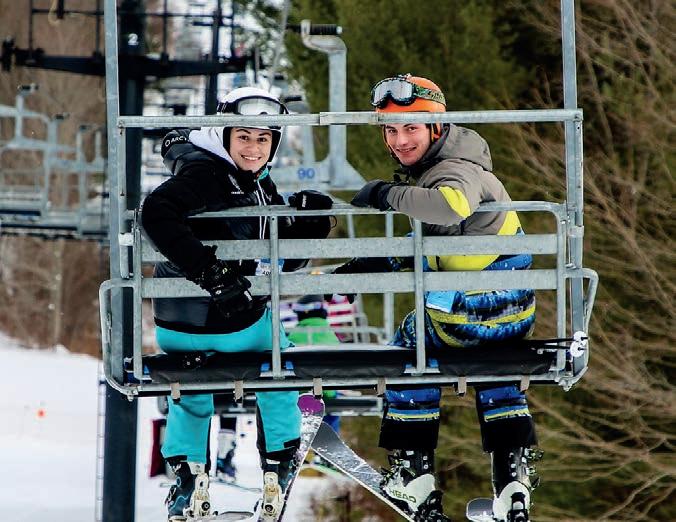
Tell us about the Outing Club’s mission and how you got involved. MARYBRIDGET: We are still working on a set mission statement; however, I think the main goal of the club is to get more people involved and excited about the natural world, to explore new activities, and get out in nature or experience a new skill. I got involved with the Outing Club because I love to be outdoors and it was a great little group to challenge myself and do things I had never done before.
What (or who) inspired you to take on such an active role in this club? RYAN: What really inspired me to get involved with the Outing Club is my love of the outdoors. It was incredible to see other people sharing the same passion for getting outside and being active. I also really loved introducing outdoor activities, for example, skiing, to people who had never skied before. I also loved hearing how many ideas everyone came up with for trips that we could plan in the future.
What do you hope members gain from being involved? MARYBRIDGET: I hope that people feel like the outdoors is for everyone—that you don’t have to be super committed to outdoor activities, or be a pro at anything to join and go on some great trips. Another hope I have for the club is that members see their peers in different environments. Maybe the quiet kid from your English class is an incredible rock climber and outdoor enthusiast and could talk all day about that skill, and you would have never known that unless you went on an Outing Club trip with them. I hope the club continues to provide a space for different people to be the educator and everyone in the club to practice leadership skills.
What do you hope the club achieves moving forward? RYAN: I really hope that the Outing Club is able to keep growing at Canterbury. I think that there are a lot of opportunities for many different trips that would attract students with a wide variety of interests. We had so many ideas for trips that we didn’t get to do this year. I even hope that someday the Outing Club might be involved in some orientation activities for new students. I think that the outdoors are a great place for new students to get to know each other and bond.
DIVERSITY AND INCLUSION CLUB
Maliyah Perkins ’20 The Canterbury Diversity and Inclusion Club was founded in 2017, and Maliyah helped lead the club during the 2019-20 school year. She also facilitated workshops during Social Justice Week, and was the master of ceremonies during the Fourth Form Retreat Oxfam Hunger Banquet, which highlighted issues surrounding hunger and poverty. Maliyah was a member of the track and field team, and she is enrolled at University of Connecticut, CT, where she is pursuing a major in political science.
Tell us about this club’s mission and how you got involved. The CDIC seeks to promote diversity on campus, whether it be through discussion, films, presentations, activities, etc. We look for ways

to educate Canterbury’s community in areas that make us diverse. I went to the first meeting when the club began in my Third Form year. I went because it is important to recognize and discuss topics like race, and for people to have a space without judgment to speak freely and feel comfortable sharing their own experience. What were some of the most significant things you learned from your leadership role? This club allowed me to become more comfortable talking about topics that many find uncomfortable to speak about. I learned to lean into discomfort, and that you can only speak from your own truth and experience, which is important and valued. It made me more passionate about seeking ways to bring more diversity to campus and emphasized how important it is to have a diverse and educated community.
What do you hope members gain from being involved? I want people to be able to speak from their own experience and be comfortable doing so. I hope members gain a better understanding of their peers and learn how their experiences may differ from those of their classmates.
CHICKEN KEEPERS CLUB
Erin Sudbey ’20 The Chicken Keepers Club was started at Canterbury in 2016, and Erin Sudbey was the club’s President for the 2019-20 school year. Erin was a Sacristan, Proctor, and Lead Ambassador, and was a recipient of several awards, including the Edward F. Mack Award for Outstanding Contributions to Community Service, the Hubert Mcdonnell Award for excellence in the study of theology, the Terence F. Carmody Award for excellence in the study of Spanish, and the esteemed Dr. Nelson Hume Award, given to the Sixth Former whose leadership, character, and achievements have been of the highest order, and whose performance embodies the ideals of the School’s founder. She has also been recognized with a National Community Service Award in consecutive years by the United Nations Association for her commitment to helping others. Erin is currently enrolled at Boston College, MA.
Tell us about this club’s mission. The Chicken Keepers Club is committed to educating about the importance of agriculture and self-actualization, stewardship, and respecting food sources, and is focused on understanding self-sustaining agriculture, learning how to manage egg-sales and a budget, giving back to the community, and maintaining a successful flock. The club donates a percentage of the money raised from selling eggs to Heifer International, an organization working to end hunger and poverty around the world by providing livestock and training to struggling communities.
What do you hope members gain from being involved? Through the organization Heifer International, I hoped that members would gain a better understanding of the importance of agriculture and farming in self-sustainability and in women’s empowerment. Heifer International works

with farmers and small business owners across the globe, and in our little campus in New Milford, CT, we have the unique opportunity to explore what it means to utilize agriculture and connect with the environment. Given that attending a boarding school is a privilege, I found it especially important to recognize how the opportunities we have and the education we are provided can be put to a greater purpose, one that is not self-serving, that places emphasis on helping others, and values the land and animals.
Do you plan to start or join a similar club in college? During my time at Boston College, I plan to continue doing service work and exploring the many different ways in which I can give back to the local community. It’s hard to say whether I’ll find myself in a chicken coop while in college, but I never expected to be in one when I started at Canterbury, so who knows!
MEETING OUR STUDENTS WHERE THEY ARE

Students proudly wore t-shirts from their soon-to-be alma mater on College T-Shirt Day.

This unprecedented spring, Canterbury shifted to distance learning and online experiences to keep our community members safe. Despite the changes and physical separation, one thing was clear: the distance only made our family of Saints stronger. Like most schools across the world, Canterbury made the diffi cult, albeit necessary, decision to close down the campus in the beginning of March due to the outbreak of COVID-19. While during the early stages the School was still cautiously optimistic about a return to campus later in the spring, it quickly became apparent that the 2019-20 school year would conclude quite diff erently than anticipated.

On March 30th—and for the fi rst time in its 105-year history—Canterbury began the spring semester remotely, following the end of an extended March break. In order to ensure the best experience for its students, Canterbury faculty and staff spent the three-and-a-half weeks between the closure of campus and the start of online distance learning consulting with medical and public health experts (including Director of Health Services Colleen Cook, R.N. ’02, School Physician Ken Marici, M.D. ’87, P ’20, ’22, and Trustee Anna Flik, M.D. P ’21); brainstorming and collaborating with peer schools; mastering new technologies and teaching methodologies; creating engaging and interactive online lessons; building web pages and social media accounts to keep the community healthy and connected; and making themselves available to students who had questions, concerns, or just wanted to talk. The faculty adjusted to these monumental tasks in the only way they knew how: by pouring all of themselves into the new endeavor to make the transition as seamless as possible for students. The School took a holistic approach to distance learning, focusing not just on providing academic excellence, but physical, and emotional wellness, too. As providing academic excellence, but physical, and emotional wellness, too. As classes, School Meetings, activities, traditions, and even athletics, pivoted to an classes, School Meetings, activities, traditions, and even athletics, pivoted to an online format, it was expected that there would be some bumps and hiccups online format, it was expected that there would be some bumps and hiccups along the way. However, what this spring proved was that Canterbury prepares its along the way. However, what this spring proved was that Canterbury prepares its students (and faculty) to meet any challenges that arise head-on and with grace. students (and faculty) to meet any challenges that arise head-on and with grace.
— ISABELLA COTIER ’20 (BROWN UNIVERSITY ’24)
ACADEMICS
Though moving to of the schedule also promoted online classes was online classes was time “away from the screen,” certainly an adjustment, certainly an adjustment, so that students could still have Canterbury’s Distance Canterbury’s Distance opportunities to take breaks, Learning Plan made Learning Plan made exercise, and socialize to the best use of tools such as use of tools such as of their ability. Veracross (Canterbury’s learning Veracross (Canterbury’s learning For international students, the management system) and Google management system) and Google timing of classes was the biggest Suite that were already familiar to challenge, as many were not students and faculty and helped able to join in real time. Faculty ease the shift. The plan included ensured each student felt included both “synchronous” (live) and and confi dent in their coursework “asynchronous” (on-demand) and had opportunities to work learning opportunities through with their peers. Jiayi Wu ’20 Zoom and Google. Synchronous (Vanderbilt University ’24), is classes occurred in real time, from Shanghai, China, and said with students attending virtually that though she was not able via Zoom. These classes were to attend most live classes, she recorded so that if a student was felt supported and prepared for absent or living in a time zone college after the spring semester. that was incompatible with the “As an international student, I class schedule, they would be was not able to attend classes able to watch the recordings in synchronously due to the time their own time. Asynchronous diff erence. Nonetheless, my classes took place via Veracross, teachers posted the recorded allowing students to engage in classes online for students like class materials and complete work me to watch and changed the at their own pace, typically within due dates of assignments and a given timeframe, often using assessments accordingly.” She discussion boards to drive peer-to- continued, “Since timed tests peer engagement. were no longer practical, we The schedule of classes was were asked to do more group abridged to fi ve days (Monday- projects, which also helped us to Friday), with each class meeting check our progress and review synchronously twice per week what we had learned. Thanks to (once for 60 minutes and once for the support of our community, I 45 minutes), allowing students’ was able to fi nish strong and felt work to be staggered appropriately very much prepared for college through the week. The fl exibility academically.” Science Teacher Derek Richardson documented one of his fi rst virtual Animal Anatomy classes for Third Formers.

Just as with a typical, in-person course, faculty were available daily for scheduled “offi ce hours” to off er students time to connect about the class material, ask questions, and check-in on projects and assignments. Faculty made sure to include virtual oneon-one time with each student to assess their understanding of the lessons and identify any points where they might need extra help, often in collaboration with the Donovan Center for Learning (DCL). Over the past three years, the DCL has emerged as a hub for every Canterbury student to practice distinct academic and organizational habits that will pay immediate and future dividends throughout their lives. The DCL remained a steadfast resource this spring, helping students learn how to manage their time within the new schedule, off ering oneon-one tutoring with a faculty member or peer in any subject, developing study skills and testtaking methods, and preparing for standardized tests (though many were later postponed). The DCL provided students with invaluable skills and tools to become successful learners no matter the course or its format.
These skills were certainly pertinent for Sixth Formers, many of whom will continue with distance learning as they embark
on their college careers. Without the possibility of in-person college visits this spring, the College Counseling department went into overdrive, helping Sixth Formers complete virtual visits and putting them in touch with college representatives, current students, and alumni to help them feel confi dent in their decisions. The department held weekly College Workgroups for Fifth and Sixth Formers and met individually Formers and met individually via Zoom. They were even able via Zoom. They were even able to replicate their Spring College to replicate their Spring College day activities by off ering a mock day activities by off ering a mock application reading exercise application reading exercise for students and parents, and for students and parents, and college representatives helped by college representatives helped by recording themselves breaking recording themselves breaking down the applications and down the applications and highlighting the aspects of each highlighting the aspects of each that they found important. For that they found important. For many of our 2020 graduates, the many of our 2020 graduates, the biggest challenge as they start biggest challenge as they start at their respective colleges and at their respective colleges and universities will be fi nding their universities will be fi nding their own community within their own community within their school while socially distancing or school while socially distancing or participating remotely—especially participating remotely—especially after coming from such a closeafter coming from such a closeknit family at Canterbury. knit family at Canterbury. Saints know that one of the most Saints know that one of the most defi ning qualities of a Canterbury defi ning qualities of a Canterbury education is its emphasis on education is its emphasis on community. Several times per community. Several times per week, you can expect to see the week, you can expect to see the entire faculty and student body entire faculty and student body together, in one place. All-School together, in one place. All-School meetings happen three times per meetings happen three times per week, bringing everyone together week, bringing everyone together in Maguire Auditorium to share updates and stories. Sit-down lunches and family-style dinners off er the chance for students of all grades and faculty to enjoy a meal and get to know one another. Sunday Mass in the Chapel of Our Lady provides a moment of collective pause and refl ection. Sports games rally fans and friends on the fi elds and courts in support of team members. It is not just a school but a home, and the absence of so many of these the absence of so many of these community gatherings throughout community gatherings throughout the week was challenging to say the week was challenging to say the least. the least. This was especially true for the This was especially true for the Class of 2020 who saw many Class of 2020 who saw many alterations to their plans for the alterations to their plans for the culmination of their academic culmination of their academic careers. Isabella Cotier ’20 (Brown careers. Isabella Cotier ’20 (Brown University ’24) shared, “While it University ’24) shared, “While it was certainly diffi cult for me to imagine my senior spring online, my teachers and coaches helped me and my classmates navigate the uncertain times through their constant support.” She continued, “I was able to receive all of the extra help in my classes that I needed by simply stopping by needed by simply stopping by one of the scheduled offi ce hour one of the scheduled offi ce hour periods throughout the day. My periods throughout the day. My teachers were always available teachers were always available and eager to help me with any and eager to help me with any confusion that I had with my confusion that I had with my assignments. Similarly, my lacrosse assignments. Similarly, my lacrosse coaches were very supportive, coaches were very supportive, and we were all able to connect and we were all able to connect as a team over Zoom. We even as a team over Zoom. We even virtually participated in the “Yards virtually participated in the “Yards for Yeardley 5K Challenge,” for Yeardley 5K Challenge,” which was a great experience that which was a great experience that made our team feel even more made our team feel even more connected.” connected.”

(CONTINUED ON NEXT PAGE)
“Thanks to the support of our community, I was able to fi nish strong and felt very much prepared for college
academically.”
— JIAYI WU ’20 (VANDERBILT UNIVERSITY ’24)
A stormy evening sky in April settles over the Nelson Hume building and Steele Hall. Photo by Grace LaVigne ’20.
ACADEMICS
CONTINUED
Many of the traditions and activities, like prom, the Sixth Form Retreat, senior week in sports, college visits, and, of course, Commencement, could not take place in the way the graduating class had envisioned. Without the possibility of a large, in-person Commencement Ceremony and all the deserved fanfare it is preceded by, it became even more important to honor all those individual and collective achievements of a class who have not only persevered but have become a part of history. Canterbury faculty and staff held virtual planning meetings with the graduating class to brainstorm ways to carry on celebrations and traditions safely and remotely. They performed several dress rehearsals for the ceremony itself, created virtual versions of important traditions like the painting of the rock on Sheehan Family Field and shaking each faculty member’s hand at the end of graduation, and sent care packages to each student prior to Commencement. While the 103rd Commencement Exercises looked very diff erent from past years, they honored the Class of 2020 with enthusiasm, gratitude, and pride. Director of Counseling Cynthia Willmen leads a weekly virtual mindfulness session to help students and faculty start their day.


HEALTH, WELLNESS & SPIRITUALITY
Keeping the health of the community at and also included an option to submit questions the forefront, Canterbury expanded its anonymously—be they about nutrition, fi tness, services and off erings to accommodate health, wellness, or spirituality—that would be students wherever they were. To answered by corresponding faculty and staff . With replicate the welcoming, “open door” the global health landscape changing week-tonature of both our Health Center week, Canterbury also off ered a Weekly Q&A and the Center for Spirituality, Service & Justice, via Zoom for parents and families with Head of the School created a webpage for students that School Rachel Stone, Director of Health Services includes tips and resources for promoting physical, Colleen Cook, R.N. ’02, and other members of the emotional, and spiritual health. Administrative and Health Services teams.
Through the Health & Wellness website, students were able to connect with faculty in whichever way they felt most comfortable to fi nd support or answers. The website allowed students to book virtual one-on-one appointments with the
School’s nurses, athletic trainers, and counselors, In addition to the opportunity for personalized support, the website included a wealth of information and resources for students to explore on their own, including emotional health and coping strategies with links to helpful apps; physical fi tness ideas and challenges; and nutrition tips and
Athletic Trainer Steve Gooler shows students via video how to create their own “rowing machine” at home.




Spirituality remained a vital part of school life with live streams of music playing in the Chapel of Our Lady, virtual meditation and journaling opportunities, and the traditional Baccalaureate Mass celebrated by Fr. Mark Connell (pictured here).
recipes. Four days a week, Director of Counseling Cynthia Willmen invited students to participate in morning refl ective meditation and mindfulness exercises, with the intention to teach students and faculty how to practice staying present through challenging times. Athletic Trainer Steve Gooler created weekly workouts and showed students how to make some of their own athletic equipment to help keep them physically active. In fact, students became so dedicated to continuing their athletic pursuits that Steve customized workouts by request and also helped organize weekly fi tness challenges. Collectively, students “planked” over three hours, with students in the Fifth Form planking for two minutes on average! This challenge turned into a Form competition each week with alternating activities for students to test their skills and get active. Theology teacher and Director of the Center for Spirituality, Service “Throughout such a trying time, it was diffi cult to stay mentally positive. But the contribution from the SEC [Canterbury Student Events Committee] and the support groups (like the Health Center Wellness Checks and meditation) the School offered helped me greatly.”
— SEAN QUAYE ’21
& Justice (CSSJ) Tracy GarciaLaVigne posted tips to nourish the body and soul, including several nutritious and easy-tomake recipes for students to try at home. Without weekly Mass to bring the community together, Tracy kept students engaged in spiritual dialogue by posting journal prompts each week to help them refl ect and process, and included daily prayer videos from Sacristans. She also shared live streaming music playing in the Chapel of Our Lady on Good Friday so that anyone from the community could virtually join and say a prayer or use the time for meditation, refl ection, and prayer.
As service to others is one of the main served as a way for students to stay tenets of Canterbury’s education connected to each other and to and a focal point of the CSSJ in faculty outside of classes through particular, Tracy also made sure that the spring semester and has been students could remain connected to updated to continue to serve the many of the organizations where community through the 2020-21 they volunteer. Students wrote letters school year. In addition to its initial to residents at the local Village Crest features, the site now includes Nursing home, as they were not helpful tips and links about how to allowed visitors, and they responded choose, wear, and care for a mask, with a heartfelt video saying how protocol for social distancing while much they missed their Canterbury on campus, information about visits. Several students also took it COVID symptoms and testing, and upon themselves to make or donate how the School will be monitoring masks and PPE to the Town of New the situation on campus. Milford to be distributed to local (CONTINUED ON NEXT PAGE)
essential workers. The Health & Wellness webpage
STUDENT LIFE
While this spring presented unique challenges for our faculty and staff to navigate, it was equally, if not more, diffi cult for our students. Classes moved to Zoom, many of their books and course resources available online, and athletic practices were hosted virtually, albeit with some modifi cations and adjusted workouts. Still, the one unequivocally irreplaceable facet of daily Canterbury life—some might say the most essential part of any highschool experience—was missing: friends! But in the same way that our teachers accommodated the unexpected changes of the spring and created the best learning environment possible, our students met this adjustment with deep resolve and energy. Students created new outlets to connect with one another and also used the Canterbury network already in place to maintain the type of normalcy associated with our oncampus community. The typical Wednesday afternoon advisory block became a thirtyminute period that began each day. While part of the meeting was to make sure all students were awake and ready to log into class (yes, some advisors had to hit the redial button more than once…), it also became a moment to develop relationships with each of the other students in advisory along with the assigned faculty member. In distinction to the previous weekly or bi-weekly meetings, the advisory block functioned as a breakfast class, almost as if everyone was sitting at a round table, sleepily biting on bagels together in the Dining Hall. “I felt so disconnected and lonely before online classes began in early April,” began JiWon Lee ’20 (New York University ’24). “Thankfully, my Zoom classes— especially advisory—kept me energized and they made sure I still felt connected regardless of the physical distance. It was a daily reminder that I am still part of the community and was an amazing outlet to express how anxious I felt as a rising college freshman!” Students used the lunch period, too, to replicate their daily break in the Dining Hall. And unlike during the typical year, all students and faculty overlapped in having The Girls’ Varsity Lacrosse team meets over Zoom with Coach Lindsay Mulhern. Athletic teams continued to meet virtually throughout the spring and many participated in collective challenges or fundraisers. The Girls’ Varsity Lacrosse Team completed the Yards for Yeardley 5k Challenge along with girls’ and womens’ lacrosse teams across the country to benefi t the One Love Foundation, an organization whose mission is to educate young people about healthy and unhealthy relationships, empowering them to identify and avoid abuse and learn how to love better.

the same block. Now, instead of rushing into the Dining Hall to grab something between Theology and Geometry, students and faculty were able to video each other into their own kitchens and spend a more relaxed 45-minutes. “Lunch became my favorite part of the day,” wrote Erin Sudbey ’20 (Boston College ’24). “Sometimes I ate with teammates, sometimes I ate with friends, and a few days I conferenced into Ms. Ruderman’s Zoom room to spend time with her and talk about science and crew!” In many instances, teachers reported that if their classes ever ran late into the assigned lunchtime, there would often be an uproar from the class—not because they were missing sacred free time, but because they had overlapping lunch meetings that they previously promised to attend. Part of Zooming from home, too, allowed students to get to know one another in their family spaces. Just


JIWON LEE ’20 (NEW YORK UNIVERSITY ’24)
how meeting one’s parents often illuminates a deeper understanding of friends, pieces of home life that students were eager to share better explained parts of their Canterbury experiences. In Mr. Omaña’s AP Spanish course, students used their changed surroundings to bolster their Spanish vocabulary and prepare for the auditory portion of the exam by explaining unique objects in their homes. Mrs. Roberts’ and Mrs. Darrin’s Intro to Digital Media course used random objects in their homes to “toss” to each other and challenged other classes to do the same, mirroring the social media trend that was popular this spring. Of course, even with the set Zoom schedule, the ability to stay connected posed additional challenges for our international students, many of whom were facing 10-12 hour time diff erences. And for those students who returned to their home country, many had to brave the uncertainty of long-distance travel as well as inter-country relations. “As an international student, I felt powerless that I was not able to spend my last high school spring semester with my friends and school community because I had to travel back home halfway around the world,” continued JiWon ’20. “But, with the support from teachers, especially Mr. Dellorco and Ms. Ritter and lots of creative thinking from underform students, we were able to host some amazing events, even during distance learning, especially during May’s Asian American Heritage Month Celebration.” Led by JiWon, students across Forms took charge of emailing information on their respective countries, including recipes, well-known music, and popular culture references. The event mirrored the typical oncampus celebrations in May to the best of our students’ abilities. Notwithstanding the diffi culties of distance learning and relationship building from abroad, it was our students’ self-reliance and resiliency that enabled them to strengthen their connections. In addition to celebrating Asian American Heritage Month during May, the last few weeks of during May, the last few weeks of the spring are typically dedicated the spring are typically dedicated to the culmination of semester- to the culmination of semester- and season-long work. For those and season-long work. For those students in the spring musical, students in the spring musical, Director of Theater Sarah Director of Theater Sarah Armstrong hosted a virtual cast Armstrong hosted a virtual cast party with appearances from a party with appearances from a range of non-cast member guests. range of non-cast member guests. While it was disappointing not to While it was disappointing not to be able to perform Chicago for the be able to perform Chicago for the broader community, cast members broader community, cast members defi nitely enjoyed the ability to defi nitely enjoyed the ability to celebrate their work together in the celebrate their work together in the best way given the circumstances. best way given the circumstances. Outside of the daily academic schedule, students found plenty of time to socialize in new ways. In addition to replicating in-person
(CONTINUED ON NEXT PAGE)
STUDENT LIFE
CONTINUED
student experiences via the online platforms, the Student Life Offi ce and Health Center continued to off er weekend activities for the community. Assistant Dean of Students and Director of Student Activities EJ Soifersmith—who is advisor to the Student Events Committee and de facto “campus mom”—assumed her role of putting together weekend baking classes, movie nights, and video game battles. From the student side, Sandy Xu ’21 and Andy Xu ’21 began a Cooking Club, advised by science teacher Sally Ruderman, and hosted live cooking demonstrations for their classmates. The group fi rst made simple fried rice with the attendees following their instructions over Zoom. The crowd attempted brownies during the following meeting—homemade, of course, none of that box stuff ! “Throughout such a trying time, it was diffi cult to stay mentally positive. But the contribution from the SEC [Canterbury Student Events Committee] and the support groups (like the Health Center Wellness Checks and meditation) the School off ered helped me greatly,” noted Sean Quaye ’21, current member of the Sixth Form Council. “I will most remember the fun and interactive weekend activities put together by the SEC that reconnected my friends and me outside the digital classroom Dean of Students Jake Dellorco (top) hosts a weekly “game show” on the Student Life Instagram account called Sibling Rivalry. Here, Abigayle ’21 and Alessandra King ’22 (middle) compete against Jonathon ’20 and Ian Fernandes ’22 to see which older sibling knows their younger sibling best.
and gave me a sense of normalcy throughout the pandemic.” Spearheaded by Dean of Students Jake Dellorco, English teacher and Third Form Council Advisor Maddie Lord, and Spanish teacher Meredith Berry-Toon also created an Instagram account specifi cally for Canterbury students. Videos on the account ranged from faculty Q&As to Form Council introductory videos, and from home tours to a weekly “Sibling Rivalry Game Show,” but one constant was the tremendous laughs that each post brought. Many throwback photos were shared—both of students and faculty—and English teacher Bob Potter shared his hat collection with curious fans. Students refl ected that “laughing about Student Life Instagram brought back our daily laughs and conversations with friends in the Center for Spirituality, Service & Justice.” Of course, students connected with Of course, students connected with one another informally, as they do one another informally, as they do during the year. Using Facetime, during the year. Using Facetime, Snapchat, countless iMessages, Snapchat, countless iMessages, Instagram—and perhaps the most Instagram—and perhaps the most important social media network of important social media network of Generation Z, TikTok—became Generation Z, TikTok—became a part of the norm instead of an a part of the norm instead of an additional aspect of one’s daily additional aspect of one’s daily interpersonal interactions. As interpersonal interactions. As this extraordinary community this extraordinary community continued to not only sustain itself but grow stronger, our students used social media to connect and fi nd levity through self-made videos and shared photos and quotes about what they missed from the hilltop and what it means to be a Saint. To be sure, the Canterbury community remained united and the School’s Five Values—Honesty, Respect, Compassion, Spirituality, and Self-reliance—continued to be exemplifi ed daily, along with a healthy dose of joy and humor. No matter where they were, our Saints have continued to earn an education for life.

As this extraordinary community continued to not only sustain itself but continued to not only sustain itself but grow stronger, our students used social grow stronger, our students used social media to connect… through self-made media to connect… through self-made videos and shared photos and quotes videos and shared photos and quotes about what they missed… and what it about what they missed… and what it means to be a Saint.
SAINTS IN ACTION
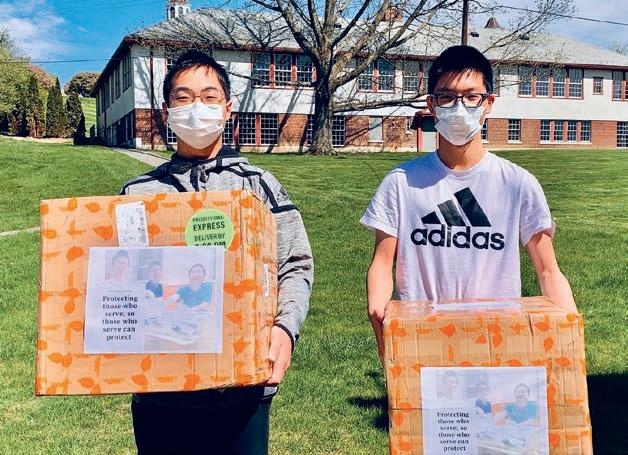
Several Saints volunteered throughout the pandemic to help their local communities
Yijie Wang ’23 and Kai Xu ’21 delivered 3,600 masks on behalf of the Canterbury Chinese Association to campus to be donated to the local New Milford Community. Photo taken prior to students leaving campus for March Break.
and Fishes Hospitality House, Camella’s Cupboard, and the New Milford Social Services Food Bank, and their mission is to continue to make them for charities and other groups such as daycare centers, farms, non-profi ts or small medical offi ces in New Milford. Lorelai
Lorelai Lee Swanek ’21 and her family spent their time at home learning how to sew in order to make and donate masks to their community. and her family were featured in the New Milford Spectrum for their efforts
Our Saints inspire us every personal service with progress toward where Lorelai shared, “I just wanted to day, but the way many the UNA’s Global Goals and its values of do something to help people, but as of them stepped up for Connectedness, Compassion, Curiosity, I have been sewing more, it has been their communities during Integrity, Respect, and Spirituality. The really fun and good to have something a particularly challenging time just Ambassador Award is the highest level to keep my hands busy.” underscores what a truly wonderful of award presented by the organization. Jacob Gee ’22 and his brother Ryder group of young people we have here. (Erin also won the Ambassador Award started “Operation Toothbrush” to
This spring, three of our students in 2019 for her hours of service.) collect and distribute toothbrushes, received recognition from the United Lorelai Lee Swanek ’21 and her family toothpaste, and other personal hygiene
Nations Association of the USA and taught themselves how to sew while products to those in need during the
InnerView for their community service they were isolating at home and have pandemic. The family collected over contributions. Kayla Jendras ’20 and been making masks for the New 100 toiletry items from members of
Margaret Ondrey ’21 each earned an Milford, CT, community. They have the New Milford and Gaylordsville, CT,
Ambassador Award for completing donated the masks to the Danbury communities and donated them to the 100 hours of service across at least Federal Correctional Institution, Loaves 12 activities this school year, and Erin
Sudbey ’20 earned a Merit Award for completing 20 hours of service across Margaret Ondrey ’21 (pictured) and Erin Sudbey ’20 led the Canterbury at least four activities this school year. Blood Drive team in March, prior to Spring Break. Margaret had not yet
The platform InnerView is designed for college and high school students turned 18 so she could not give blood at the drive, but as soon as she was able to...she showed up and donated! to highlight their service activities.
The awards process seeks to connect

Danbury Food Bank and to Camella’s Cupboard, a New Milford organization that ensures no child goes without food.
Several students also combined efforts to donate masks and personal protective equipment to the Town of New Milford. Through the Canterbury Chinese Association, Yijie Wang ’23, Kai Xu ’21, and Zhe Ji ’23 raised funds and handled all the logistics to donate 3,600 masks, which were accepted by New Milford’s Mayor Pete Bass. Paul Hu ’23 and his family, Shannon Gao ’20, and Jaqueline Yang ’22 also generously donated over 300 masks to the New Milford community. Because of these gifts, the Town of New Milford was able to distribute PPE to local fi rst responders, long-term care facilities, and New Milford Hospital.
Well done, Saints!

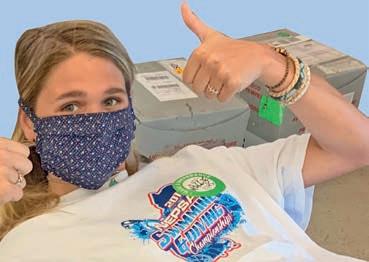
Our Roadmap for DIVERSITY, EQUITY, and INCLUSION
IT was a tumultuous summer, following a daunting spring. As the COVID-19 pandemic spread throughout the do. It is our moral responsibility to work toward human rights, to seek justice, and to model service to others. That is clear and unequivocal.” globe, a social and emotional upheaval erupted across the COVID-19, we must also focus on psychological safety, which plays an integral role in our eff orts to be an inclusive community,” said her opening remarks to faculty inequity, anger, and sadness, we diverse, inclusive, equitable, and United States, and a surge of activism ensued calling for racial “But what else,” Rachel expanded. “Core to our work on this hilltop justice. is the concept of meeting students where they are. When it comes to being inclusive and anti-racist, our students may need diff erent things For many, these simultaneous crises served as a powerful catalyst. and need them for diff erent reasons, and those needs will change as They generated a growth mindset and a new determination to they transition from high school, to college, to their lives as productive create meaningful change in our society. Canterbury alumni, citizens. Some of our students need us to understand how race has students, parents, faculty, and staff are no exception to this aff ected their lives, their choices, their opportunities, and how it renewed desire to build a truly diverse, equitable and inclusive impacts their experience at Canterbury. Some of our students need us community—both on and off our hilltop. to help them gain a deeper, more personal understanding of race and “Beyond the medical and public health safety tied to must meet them where they are so we can move forward together.” Head of School Rachel Stone in “It will be the work done by every member of our and staff at the start of the 2020- community in a consistent manner and with shared 21 school year. She continued: “As our world—and our School— language that will have the greatest impact. While we are reacted to news of racism, proud of all that has already been accomplished, we know spent the summer beginning that our work must continue in earnest and must stay to take a hard look at just how fi rmly rooted in ensuring that every student experiences racism because they simply have not been challenged to do so. We anti-racist Canterbury is…. Why? an inclusive and transformative Canterbury education.” To be sure, it is the right thing to – RACHEL STONE
Summer 2020 Arriving at a critical infl ection point this summer, the Board of Trustees and the School leadership team reaffi rmed Canterbury’s priority commitment to diversity, equity, and inclusion (DEI). While many initiatives have been implemented in recent years, the renewed charge is to discover eff ective ways to learn, teach, and engage in dialogue with every member of our community.
Rachel added: “It will be the work done by every member of our community in a consistent manner and with shared language that will have the greatest impact. While we are proud of all that has already been accomplished, we know that our work must continue in earnest and must stay fi rmly rooted in ensuring that every student experiences an inclusive and transformative Canterbury education.”
As a fi rst, small step toward helping our students process the questions and uncertainty magnifi ed by George Floyd’s killing and the unrest that followed, faculty and students engaged in antiracism forums throughout the summer. The bi-weekly discussions provided a virtual meeting place for listening, conversation, and a greater understanding of race and racism in our country.
This summer also brought the creation of a Community DEI Committee that includes trustees, alumni, students, faculty, and staff . Specifi cally, the group is composed of various intersecting roles of our community to ensure broad representation and to sustain the work and function of this Committee for many years to come. Most signifi cantly, the call for student volunteers to join the group was met with an extraordinary response, with nine students stepping forward with personal stories and motivations, each one more compelling than the next.
“For any committee like this to be eff ective, everyone involved must feel empowered to speak freely; we must create a safe environment for the free interchange of ideas, and these ideas must be respected, debated and heard,” said Bob Steers ʼ71, President of the Board of Trustees and member of the newly formed Community DEI Committee. He continued: “We will address myriad topics relating to DEI and will share a great responsibility and accountability to one another and to Canterbury. I know I will learn a lot from my fellow Committee members, and the Board is committed to supporting the key initiatives that will come from our work.” To facilitate discussion this summer during anti-racism forums, faculty and students read, watched, listened to, and discussed relevant articles, essays, books, podcasts, studies, movies, and interviews. A small sampling of those include:
White Fragility
BY ROBIN DIANGELO
“Refl ections from a Token Black Friend”
BY RAMESH A. NAGARAJA
BY JODY GRAY
Tell Me Who You Are: Sharing Our Stories of Race, Culture, & Identity
BY WINONA GUO AND PRIYA VULCHI
“Uncomfortable Conversations with a Black Man”
BY EMMANUEL ACHO
Teaching Community: A Pedagogy of Hope
BY BELL HOOKS
BY DENA SIMMONS
HOSTED BY KIMBERLÉ CRENSHAW
BY PEGGY MCINTOSH
BY SCENE ON RADIO
COMPOSITION OF COMMUNITY DEI COMMITTEE
• AHANA Faculty Advisor • Chief Advancement Offi cer • Dean of Faculty • Dean of Students • Director of the Center for Spirituality, Service &
Justice • Director of Curriculum • Director of Dining Services • Founder of Saints on the
Hill and founding member of AHANA • Head of School • Member of the Board of
Trustees • Member of the Society of Alumni Executive
Committee • President of the Board of
Trustees
A PARTIAL LIST OF COURSE OFFERINGS THAT DEMONSTRATE CURRICULUM INCLUSION AT CANTERBURY
• Honors Race Theory • American Voices • Syracuse University Project
Advance: Gender and
Literary Studies • Honors History of Latin
American • Modern Middle East • AP Spanish Literature and
Culture • Human Relations • Service Learning and
Social Justice • World Religions
The Committee’s fi rst charge will be to conduct a comprehensive needs assessment, which will inform its work in crafting an action plan and long-term goals refl ective of Canterbury’s enduring commitment to social justice and to a diverse and inclusive school community. Most of all, the Committee will harness our collective desire to do better, be better, and assure that this powerful movement does not become a passing one on our hilltop.
In August, Canterbury faculty immersed in fi ve days of in-service meetings, led by DEI consultant Margenett Moore-Roberts (see page 49) and twelve faculty co-facilitators who were trained to carry this critical work forward. Faculty members met daily in small groups during the opening meetings and will continue to do so in the year to come. Likewise, nearly 50 student leaders—Sacristans, Sixth Form Council members, Boarding and Day Student Proctors, Lead Ambassadors, International Student Ambassadors, and Interfaith Council members—were trained in these very same principles of diversity, inclusion, and belonging. These imperatives are being threaded throughout conversations with all of our students during dedicated Saturday programming this year, for it is our collective responsibility to help our students develop informed opinions as part of their growth in values, character, civil discourse, and service to others. We are committed to doing so.
Foundational Work When Rachel Stone was appointed Canterbury’s sixth Head of School in 2016, one of her fi rst initiatives was strengthening and sustaining a student-centered culture—a culture that included being mindful of and supporting the myriad perspectives and cultures that exist in the Canterbury community. This intentional eff ort was aimed at placing the student experience at the center of the School’s work, including a commitment to ensuring that belonging and acceptance became fundamental to who we are as a school.
Empowered by an affi rming environment, students were inspired to bring greater awareness to and appreciation for the varied backgrounds and identities of their fellow Saints. Supported by an administration and faculty that honored their passions and leadership, students founded affi nity groups such as AHANA (students of African, Hispanic, Asian, and Native American descent), the Gender-Sexuality Alliance (GSA), and Canterbury’s Diversity and Inclusion Club (CDIC). These student-led groups have since become an intrinsic part of campus life and are providing a space for our students to own and speak their truth. (See article on page 33.)
Similarly, in 2016 and through the aspirations of Sherley Arias-Pimentel ’19, then a Fourth Form student (and a galvanizing force!), Saints on the Hill was born. The program began as a way for community members to reveal aspects of themselves, celebrate their stories, and, in highlighting diff erences, fi nd similarities while adding to the diversity of thought and experience at Canterbury. It has now extended into its fourth year as a revered tradition during Thursday School Meeting.
The Center for Spirituality, Service, and Justice (CSSJ) took form in 2017, centralizing the School’s programming that fosters students’ spiritual growth and discovery, social justice and responsibility, and human rights advocacy, all with a keen focus on developing students’ moral and servant leadership. Among many other programs and activities held throughout the year, the CSSJ hosts Canterbury’s annual Social Justice Week, anchored by the School’s observation of Martin Luther King Jr.’s life and legacy and the American civil rights movement.
Since 2019 and with a commitment going forward, faculty and students have attended the National Association of Independent Schools (NAIS) annual People of Color Conference as well as the Student Diversity and Leadership Conference at both the state and national levels. Additionally, Canterbury has reviewed and updated its curricula in recent years to not only enrich the challenge and rigor of its academic program but to provide a broader range of historical and cultural experiences and to help students learn to appreciate diff erent perspectives and embrace diversity in a socially responsible way. Finally, beginning in 2019, the School has administered climate surveys and Sixth Form exit interviews to measure student perceptions around community, belonging, and inclusion.
The Path Forward As a community, we do an excellent job of weaving our Five Values of Honesty, Respect, Compassion, Self-Reliance, and Spirituality into everything we do. Now, and perhaps more important than ever, we must embrace a true application of how we live these values. In other words, the reason why we must grow even more committed to our diversity, equity, and inclusion work is that helping students to become moral leaders in a complex, secular world starts with an inclusive, anti-racist, self-aware mindset.
While Canterbury’s DEI work has been underway for several years, the experiences of our students—past, present, and future—provide the most compelling catalyst for our path forward. “As educators, we need to dedicate ourselves to creating the type of culture and environment within our school that we hope to see represented outside our campus,” said Rachel. “If we can do that well here and create safe spaces for students to feel welcomed and appreciated for who they are, and provide them with the opportunity to fl ourish, to take risks and grow as human beings, then they can take those experiences they learn here and go do the same in the communities they enter after their time at Canterbury. If we can establish this ethos in our students now, we can work to have a positive impact on the world, but it has to be front and center, and we have to do it right.”
MARGENETT MOORE-ROBERTS


Margenett Moore-Roberts is Chief Inclusion & Diversity Offi cer at Constituency Management Group or CMG, a division of Interpublic Group. In her role, Margenett collaborates with executive leaders to develop and activate business practices that deliver on the inclusion imperative and enhance business through the adoption of broader perspectives. She joined CMG in 2018 after serving as Global Head of Inclusive Diversity at Yahoo.
Margenett Moore-Roberts pioneered Yahoo’s Offi ce of Inclusive Diversity and served as its fi rst Global Head of Diversity & Inclusion, successfully elevating inclusion and diversity as mission-critical initiatives for the web services giant. She is an accomplished executive with a proven track record for developing business-focused DEI strategies and facilitating transformation through the lens of inclusion, equity, and diversity.
As an Inclusion and Diversity thought-leader, Margenett drove the development of Yahoo’s corporate point-of-view on inclusion. She was the leading voice in shaping corporate communications around challenging topics like the North Carolina “Bathroom Bill” (also known as House Bill 2), the 2017 Travel Ban, police brutality and Black Lives Matters, and pay equity. Representing the company at national events, including the White House Conference on Inclusive STEM Education, the Watermark Conference for Women, Big Omaha, Grace Hopper, the National Diversity Council, AdColor, and more. Her point of view was featured in digital publications, including TechCrunch, the Huffi ngton Post, BBC Worldwide (London), and Tech Diversity Magazine. Margenett’s honors include being recognized as a Top 50 Multicultural Leader in Tech (California Diversity Council), a 2017 MAKERS@ Award recipient, and winner of Marissa Mayer’s CEO Excellence Award.
Margenett has consistently delivered strong business results throughout her career. At Yahoo, she created and led the growth of the company’s fi rst video advertising network, generating more than $100 Million in revenue over 3.5 years.






